

Ph.D. Programs in Library and Information Sciences
Written by Kelly Davis
MLIS – Clarion University | Youth Services Librarian
A Ph.D. in library science or information science provides scholars with the tools to produce individual research, collaborate with other researchers, and teach library and information science in higher education. The standards are not as concrete for Ph.D. programs as for Master of Library and Information Science (MLIS) programs, but there are a few ways to rank a program’s quality. One way is to look at the school of information offering the Ph.D. and the other programs they offer, including if the school provides an MLIS degree and if the degree is accredited by the American Library Association. Another sign of a quality program is seeing the research and progress made by graduates and faculty and how much access a Ph.D. student will have to quality research opportunities.
In this article, we highlight some of the most comprehensive Ph.D. programs in the U.S. based on these two significant factors. We also try to provide a few programs in each region of the U.S. in the hopes that one of the programs will be near you. Additionally, we will look at many other aspects of each program as well, including the format, what the coursework involves, and how to apply and become qualified for each Ph.D. program in library and information science.
All of the following Ph.D. programs come from a school that is accredited by the American Library Association and offers students the ability to work with decorated and world-class scholars and professors. Additionally, the programs we chose are in areas that provide ample career opportunities following the program. If you want to know more about each program and what may be a good fit for you, keep exploring below.
ADVERTISEMENT

- ACBSP Accredited
- Flexible Online Courses
- Financing Options Available
Liberty University
Online D.B.A. in Information Systems
Experience real-world applications, equipping you as an innovator in strategy, security, ethics, design and development, and business process support.
Ph.D. in Information from the University of Michigan
Doctoral students will work one on one with professors in information, many of which specialize in communication technologies, collective research capabilities, and how to change social relations. All professors know a wide range of research and topics and look at information and how individuals and communities interact with information and technology. Additionally, in your application, you will pick which professors you want to work with out of the 100 in the program.
Many Ph.D. graduates receive careers as professors at prestigious schools including Brown University, Stanford University, and the National University of Singapore. Many receive fellowships at prestigious universities including Harvard University and Brown University. Other careers they received shortly after graduating include UX researcher for Google, Yahoo, and Facebook, design researcher for IBM, and data analysis for Microsoft.
How to apply
First, apply online and pay the application fee. Send in a Statement of Purpose essay which will include the area of research you want to contribute to and past research done. Additionally, you will need to send in a personal history statement, a resume, three letters of recommendation, and transcripts. Your admission acceptance will be multifaceted in the factors the program will examine. Namely, they will look at past research, work experience, and your goals moving forward.
Ph.D. in Information Studies at Long Island University
The Ph.D. program includes a dissertation and requires 60 credit hours. There are two areas of study for students which are Information Access and Systems, and Information Studies and Services. Additionally, this program can be taken part-time or full-time to accommodate students’ schedules. The on-campus classes can be taken between 6 PM and 9 PM. It is also the only program of its kind in the Metropolitan New York area, and it is within a school that is accredited by the American Library Association.
How to Apply
You need a master’s degree to qualify, which can be in any area of study. Admissions will also evaluate you based on previous research, work experience, and the interest you have in research going forward. Then apply online , and pay the application fee. You will also need to send in transcripts, three letters of recommendation, a statement of research and area of study, a resume, a personal statement, and a sample of scholarly writing.
Ph.D. in Information Science and Technology at Syracuse University
Syracuse University offers its Ph.D. scholars opportunities to work and research one on one with professors and other doctoral students. The research opportunities are in areas of philosophy, psychology, sociology, computers and digital information, policy studies, librarianship, and information communication. This program is not offered online or part-time. It is a four to five-year program of full-time residential coursework. The Ph.D. student is funded by the school, and for this reason, the program is very selective.
Apply online , pay the application fee, and send in transcripts and any other research or work experience completed. Applicants will be evaluated by a committee based on their readiness for the program, their intellectual ability and academic record, research interests as they relate to faculty interests, communication skills, and research preparedness.
Ph.D. Philosophy in Information and Library Science at the University of North Carolina at Chapel Hill
Chapel Hill is the most respected information science department in North Carolina and its MLIS program is often ranked first or second by the U.S. News and World Reports. Their doctoral program is sure to hold to the same standards. Many of the faculty for the MLIS program are also professors in the doctoral program. The difference is that Ph.D. students work one on one with these world-class professors. The program is rigorous, but it provides some flexibility for those holding a job, or have families to care for. There is financial support for Ph.D. students and many receive full support for the first four to five years of the program; typically, students finish within that period. Students learn more about library and information science and they enhance their research and presentation of research capability.
How to apply
Accepted students in this program are often seeking to be information leaders, have a knowledge of diverse research methods, enjoy being an independent investigator, are committed to finding information to address critical questions, and enjoy intellectual challenges. Applicants must have either an MLIS degree or an equivalent of study and research completed. To apply, go online and fill out the online application and pay the application fee. Also, send in all transcripts, an updated resume, three letters of recommendation, and a statement of purpose that includes your area of research interest.
Ph.D. in Communication and Information at Kent State University
The Ph.D. program in communication and information from Kent State University in Ohio is part of the information science school, which has been around for over sixty years. The program is offered online and in person and is a 70-credit hour degree program including a dissertation. Doctoral students must also pass the doctoral comprehensive examination to graduate.
The degree program is for those interested in research, information communication, teaching higher education and academic librarianship administration, and administration in other information fields. The school of information science provides and encourages outreach opportunities for those pursuing a degree in library and information science. The outreach programs give students more experience and knowledge in conducting scholarly research and analyzing the needs of communities and the diversity within those communities.
How to Apply
To qualify you must have a master’s degree and a minimum of a 3.30 GPA on a 4.0 scale. Then applicants must fill out an online application and pay the application fee. Applicants should also send in official transcripts, an updated resume, a goal statement, a sample of scholarly writing, and three letters of recommendation.
Gateway Ph.D. in Library and Information Science at San Jose State University
San Jose, California is a great place to earn a doctoral degree in librarianship and information science because of the various research options and a number of opportunities due to the variety of ethnic groups and cultures in the cities of California. The Gateway doctoral degree program in library and information science teaches students to become independent scholars as well as collaborate with other researchers and colleagues. Ph.D. students complete the program mostly online, however, there is an annual meeting that is a week-long and focuses on collaborative research. San Jose’s Gateway program also holds a partnership with the Manchester Metropolitan University, which offers doctoral students the opportunity to work with their professors as well in their research and to learn from them in coursework. With this program, students from both schools have won prestigious awards for their individual and collaborative research.
The application process is one of the more extensive doctoral programs, and the program is highly selective. There are three stages of the application process. The first is filling out an online application , paying an application fee, and sending in a statement of purpose, an updated resume of related work, unofficial transcripts, two letters of recommendation, and a 1000-word research proposal. In the second stage, the applicant is interviewed by faculty members, and they may ask for more writing samples. If the applicant makes it past the first two stages, then Manchester Metropolitan University will go over the final applicants and approve or disapprove of them.
Doctorate in Information Science at the University of Washington
The information science department at the University of Washington is known for the research their doctoral students and their faculty do. They also teach students to become professors in their field and to be administrators in librarianship. The doctoral program puts emphasis on collaboration between students and faculty, plus they care about diversity in ethnicity and culture with the idea it brings richer research due to a mix of different backgrounds. The Ph.D. students also learn about UX, or User experience, which is how to evaluate a culture or group and its relationship with information and technology. Doctoral students are also taught to use various research methods and various ways to present information and research results.
To qualify for the doctoral program, applicants must have a bachelor’s degree with an average 3.0 GPA on a 4.0 scale, and a master’s or other additional higher education degree is preferred. However, admissions also look at your experience, interest and goals, and scholarly research. Applicants can apply online . You will need to pay the application fee, send in transcripts, a personal statement, a diversity statement, a research statement, three letters of recommendation, and your interest in areas of research and which faculty member(s) you prefer to work with.
Ph.D. in Library and Information Science at Simmons University
Simmons University is located in Boston Massacutes which provides an ideal environment for research and study. Boston is full of history, diversity, and cutting-edge technology. The area also has a multitude of career opportunities after graduation. This degree program provides a flexible format for those who do not live in the area because the courses can be taken online. Additionally, students can take a mix of courses online and in person. The main focus of the degree program is to further skills in research and teaching within the library and information science. Doctoral students also gain skills in organizing, analyzing, retrieving, and managing information. Students also learn how to preserve materials and learn more about archiving physical documents and digitizing documents for online archives. Simmons University also partners with other universities in other countries for higher quality and diversity of research.
To qualify for the program, applicants need either an MLIS degree or an MS degree in Library and Information Science from a program accredited by the American Library Association. To apply, go online and fill out the application and pay the application fee. Also, submit all transcripts from any colleges or universities you attended, and send in a statement of purpose, three letters of recommendation, a writing sample of previous research, and a comprehensive curriculum vitae.
University of Texas at Austin Ph.D. in Information Studies
The University of Texas at Austin has a well-funded Ph.D. program in information studies that allow for new technology to be a part of the curriculum and research. The doctoral students also can learn and then teach other institutions about various new technologies and the best ways to implement them to meet their community’s needs. Additionally, Austin is an advancing and thriving city in the midst of technological growth, and the city offers opportunities for research and careers in information science. The program includes a dissertation and 39 hours of coursework. During this time, students will produce two peer-reviewed scholarly journals.
You do not have to have a master’s degree to qualify for this program, but you do need a bachelor’s degree and an average 3.0 GPA on a 4.0 grading scale.
Then, apply online and pay the application fee. Afterward, send in three letters of recommendation, and a statement of purpose.
The University of North Texas’ Information Science Ph.D. Program
The Doctoral program at the University of North Texas is the nation’s largest Ph.D. program in the Information Science discipline. It is also interdisciplinary so that students can work with students and faculty in various other degree programs including geography, computer science, engineering, linguistics, and merchandising. The program also has concentration options and dual degrees in data science consumer behavior and experience management, journalism cybersecurity, geospatial information systems, health informatics, and linguistics.
To qualify for any doctoral program you must have at least a 3.50 in either your undergraduate degree or your master’s degree. Also, talk to the admissions department for the information science department. Then apply online , send in transcripts, pay the application fee, and send any other documents or scholarly writing the application requests.
Florida State University PH.D. in Information
Florida is a great state to earn a Ph.D. in library and information because of the diversity in the state of Florida as well as the environmental and marine biology research that is done in Florida. This is good for research opportunities as well as career opportunities. The number of good colleges in FLordia provides many career opportunities as well.
Florida State has a program called the iSchool and it is ALA-accredited. Additionally, their doctoral students are able to travel across the U.S. for presenting at conferences like the ALA conference, ACM CHI Conference on Human Factors in Computing Systems, and the Association for Information Science and Technology conference.
To qualify you must have a master’s degree and at least a 3.0 GPA. To apply, fill out the online application and send in a resume, statement of purpose, writing sample, and three letters of recommendation. Right now the GRE requirement is waived. Be sure to speak to an admissions counselor for any additional application requirements or recommendations.
Library and Information Science Ph.D. Programs Final Thoughts
Ph.D. programs in library and information science are worth pursuing if you have a passion for sharing information through various modes to communicate with other scholars, but more importantly, with the world and its many communities. Many of these programs are lengthy and require dedication, but if you believe you have the drive to become a Ph.D. in Information and Library Science, then I hope this article helps you find a good match for your professional research and career goals.
© 2023 Library Science Degrees Online
Privacy Policy | Terms of Condition | Sitemap

Graduate Admissions
Graduate program admissions.
The School of Information and Library Science seeks exceptional students who have the potential to excel in graduate studies and to become future leaders in the field. We try each year to assemble a student body that is diverse on many levels (i.e., race, ethnicity, age, physical ability, cultural perspective, intellectual background, and work experience) to foster the most dynamic learning and research environment possible so that faculty and students challenge each other to explore and envision the possible.
Requirements
We use many facets of the student’s application to arrive at an admissions decision:
We look for strong academic records, judged by the applicant’s past Grade Point Average (GPA), and we examine the coursework on the student’s transcript(s) to determine personal strengths and areas of mastery. Recently accepted graduate students had an average undergraduate GPA of 3.5 on a 4.0 scale.
Graduate Record Exam (GRE) test scores are no longer required nor are they recommended for applicants to SILS. Applicants may voluntarily submit GRE scores if you feel that these scores would help the admissions committee understand your academic capabilities more completely. NOTE: The standardized test score field will still show up in the application as the basic application is used across multiple graduate programs here at UNC and international applicants are still required to submit TOEFL scores.
The TOEFL or IELTS test (no more than 2 years old) is still required for international applicants, with the following three exceptions:
- You are from countries where English is the SOLE OFFICIAL language of instruction.
- You have received or will receive a degree from an accredited university in the United States.
- You have received or will receive a degree from an accredited university where English is the SOLE language of instruction.
The UNC graduate school’s minimum requirement for admission on the TOEFL is a total score of 90. For the IELTS the minimum overall band score is 7. Most international students admitted to SILS have TOEFL scores above 100.
We emphasize the applicant’s written statement of interest in the field, and we look for questions the applicant wants to answer, areas of specialization the applicant wishes to pursue, and a beginning knowledge of the field and its issues and challenges combined with the ways in which our School (faculty, staff, and resources) might help the student delve into those issues. We want students who are excited, open-minded, and full of questions they wish to explore.
We examine the applicant’s resume for evidence of qualifications and skills based on practical work experience or exposure to different cultures and perspectives, and we look for evidence of distinction in the awards and honors applicants have received.
We read carefully the three letters of recommendation that applicants include in their application to see how professors, professional peers, or supervisors assess them and their potential. We look for distinguishing characteristics and experiences in these letters that might mark the applicants as superior and unique. We are immensely proud of our students. They challenge us – and each other – to expand our ideas, grow our imaginations, and move the field forward in its constant regeneration.
Note: As the M.P.S in Digital Curation and Management is an online program, international students are not required to obtain a Visa.
Application Process
1. Complete and submit the online Graduate School application and pay the nonrefundable $95 application fee . If you are seeking a fee waiver, please reference eligibility requirements here and contact the Graduate School directly. Applicants who are U.S. citizens or resident aliens should follow the domestic application process ; international students should follow the international application process . Be sure to complete or upload all of the following items in the online application.
- Complete the basic application .
- Upload unofficial copies of transcripts for each school attended (max 300 kB).
- Upload a résumé including work experience, special abilities and skills (max 300 kB).
- Upload a Statement of Purpose . General guidelines for the statement of purpose: Your application requires a written statement to uploaded into your application and is a critical component of your application for admission. This is your opportunity to tell us what excites you about the field of library and information science, and what problems you want to help solve in this field. Please also tell us how your prior experiences have prepared you for this next step toward your career goals and how UNC-SILS will help you achieve them .
- Arrange for three letters of recommendation . These letters are solicited by entering recommenders’ email addresses into the online application. Recommenders can upload their letters directly into your application. At least two letters should be from persons having first-hand knowledge of the applicant’s academic capabilities.
- International applicants: The TOEFL or IELTS test (no more than 2 years old) is still required for international applicants, with the following three exceptions:
- You are from countries where English is the sole official language of instruction.
NOTE: The graduate school’s TOEFL minimum requirement for admission is 90. For the IELTS the minimum is 7. Most international students admitted to SILS have TOEFL scores above 100. The University of North Carolina’s Institution code is #5816. UNC does not require a department code, you may leave that blank.
Have your official test scores sent to the Graduate School:
Graduate Admissions The Graduate School CB #4010, 200 Bynum Hall Chapel Hill, NC 27599-4010
2. Wait for your admissions decision . You will receive an email from the Graduate School accepting or denying your application.
3. If admitted, please send final official copies of your transcripts to the Graduate School: Graduate Admissions The Graduate School CB #4010, 200 Bynum Hall Chapel Hill, NC 27599-4010
Electronic copies of official transcripts are also accepted and should be emailed to [email protected]
More information for recently admitted students including detailed information on how to send your transcripts electronically can be found on the UNC Graduate School’s recently admitted student website .
4. International applicants : You are not required to provide the financial certificate at the time of application. If you are admitted, instructions on how to submit your financial certificate and supporting documents will be provided in your admissions letter. Please refer to your letter for how to upload your materials for your I-20.
Applications are not considered complete until all material has been uploaded into the application. Applications are not reviewed until all materials (forms, transcripts, test scores, essay, and letters of recommendation) have been received. Financial assistance is not considered until the applicant has been approved for admission. It is imperative that your application, including all supplementary materials, is submitted before the deadline.
Deadlines for the 2024 Admissions Cycle
Frequently asked questions.
Yes. As long as you have uploaded your essay, resume and unofficial copies of your transcripts you are able to submit your application and pay the application fee.
It typically takes between 7–10 days for TOEFL scores to match up with your application. If you still do not see your scores after 10 days, please feel free to contact us and we will help you in tracking down your scores.
We are unable to change recommenders in the system. However, you can have your new recommender email the Graduate Student Services Coordinator directly and we will be glad to upload the replacement letter into your application.
Once you enter their information and their email address into the system, it will automatically send them an email with information and link to upload their letter.
The graduate school will send you an email saying your decision is ready for you to view. You can log into your applicant portal in Slate to see your admissions decision.
Find additional application help here.
Your Statement of Purpose is an important part of your application and should answer a few important questions:
- Who are you? What are you passionate about?
- Why are you interested in research?
- What is your research experience?
- What area(s) of research are you interested in pursuing as a doctoral student?
- What are your short- and long-term career goals and how will a doctorate degree help you achieve those goals?
- Why do you think that SILS will be a good place for you to thrive as a doctoral student?
Tips for writing a successful Statement of Purpose:
- The questions above and examples given below are ones that the committee will be thinking about when reading your SoP. However, your SoP should be written in essay form (i.e., not question-answer pairs).
- There is no word limit for the statement of purpose, however average length is about two to three pages.
- Having answers to these questions will help the committee determine whether you are committed to pursuing and completing a doctorate degree. Being committed to something requires knowing what it is and how it fits with your goals.
- If you have not had formal research experience, perhaps you can describe a project that you were involved in that was open ended and required you to: (1) do some background reading, (2) define the scope of the project, (3) seek answers to specific questions, (4) think about evaluation, and/or (5) present your findings to people from different backgrounds.
- For PHD applicants only: The last question (Why SILS?) is an important one. In order to be admitted, there must be a faculty member who is enthusiastically willing to serve as your academic advisor. Therefore, your chances of being admitted will increase if there is a faculty member interested in the same research area(s) described in your SoP. You should feel free to contact faculty who might be a good academic advisor for you. While this is not required, if you mention a faculty member in your application, the admissions committee will invite them to your Zoom interview.
- The application form will ask you to list faculty members who might be good advisors based on your shared research interests. This question is optional. However, it may help the committee identify and reach out to potential advisors more effectively.
Additional Assistance
Prospective students may make appointments with faculty and staff members to discuss admission requirements, program schedules, and curriculum content. The school arranges appointments within its normal business hours (8:00 a.m. – 5:00 p.m., Monday through Friday).
Prospective M.S. in Information Science and M.S. in Library Science Students
Contact Lara Bailey [email protected] or 919-962-7601
Prospective Doctoral and M.P.S. in Digital Curation and Management Students
Contact Eleni Papadoyannis [email protected] or 919-962-0182
- Admissions Home /
- PhD Programmes /
Ph.D. Programme in Library and Information Science
All Online Application Systems are down for maintenance. Please return by 30th September, 2016 12PM.
Phd admissions.
- About PhD Programmes
- Fees Structure
- Notifications
- For any application-related queries, contact: TISS CARE 022-25525252
Location: Mumbai
Centre: Centre for Library and Information Management
Candidates are requested to check the eligibility criteria before filling the application form. Applicants will be shortlisted for the Research Aptitude Test (RAT) on the basis of them meeting the following considerations with regard to educational qualifications and research proposal:
1. Educational Qualifications: The minimum academic qualification for admission to the Ph.D programmes is a Second Class Master’s or equivalent degree in the relevant subject awarded by a recognised university in India or abroad, with at least an average of 55 per cent of aggregate marks, or a grade point average of 3.5 under the seven-point scale of the University Grants Commission (UGC). In the case of SC/ST/OBC (non-creamy layer)/differently-abled candidates, the minimum eligibility is an average of 45 per cent of aggregate marks, or a grade point average of 2.5 under the seven-point scale of the University Grants Commission (UGC).
2. Candidates who have an M.Phil or equivalent degree awarded by a recognized university in India or abroad are also eligible to apply for the Ph.D Programme.
3. Submission of a research proposal is a compulsory requirement for admission for the Ph.D. Programme. A research proposal consisting of approximately 1,000 words should accompany the proposal and indicate the Specification of the broad field of study, Statement of the research problem and scope and objectives of the study, rationale for and the significance of the study, methodology to be followed, references, and the candidate’s research/work experience in that area, if any.
Total Intake:- 5 Location :- Mumbai Thematic Areas
WILL BE SHARED IN DUE COURSE.

- PG Programmes
- Ph.D. Programmes
- UG Programmes
- Short Term Programmes
- Other Locations
- Academic Calendar
- Schools and Centres
- Teaching Programmes
- Office for International Affairs
Social Media
Initiatives
- Collaborations
- National CSR Hub
Information
- Faculty & Staff
- Jobs & Tenders
Web-Resources
- © Tata Institute of Social Sciences All Rights Reserved
- Accessibility
- Anti Ragging
- Terms of Use
The site works best on Firefox 30+ Google Chrome 45+ iOS Safari 8+ Internet Explorer 10+ Android 4.2+ Browser / Chrome Browser
Disclaimer: TISS does not endorse any information related to the admission process, entrance exams or results reported by sources other than the TISS website.

- 2022 Update
- 2021 Update
- 2020 Update
- Reputation and History
- Departments and Programs
- Faculty Recruiting
- Zoom Backgrounds
- Board of Visitors
- SCI Learning Academy
- Administration
- Faculty Directory
- Staff Directory
- PhD Students
- Diversity, Equity and Inclusion at SCI
- Diversity, Equity and Inclusion Committee
- School Initiatives and Resources
- University Initiatives and Resources
- Carving the path to safer and smarter buildings
- A holistic approach to intelligent social learning
- How to anticipate hiccups in health care
- Preserving a shared digital memory
- Holding information technologies accountable and addressing misinformation on the web
- More than an afterthought: Dr. Ibrahim shows students the necessity of cybersecurity
- Current Grants
- Faculty Accepting Undergraduate Students for Research
- Submit Research for Undergraduate Students
- Labs, Centers, and Institutes
- Visiting Scholars
- Undergraduate Research Scholars
- Degrees and Programs
- Find the Right Major for You
- Computational Biology
- Computational Social Science
- Computer Science
- Data Science
- Digital Narrative and Interactive Design
- Information Science
- BS + MS in Computer Science
- Physics and Quantum Computing
- Library and Information Science
- Intelligent Systems
- Telecommunications
- Computational Modeling and Simulation
- Information Science with a focus in Telecommunications
- Applied Data Driven Methods
- Big Data Analytics
- Cybersecurity, Policy, and Law
- Information and Network Security
- Professional Institute
- Types of Opportunities
- Experiential Learning Courses
- Meet Alexa Spaventa
- Meet J. Stephanie Rose
- Meet Lydon Pelletier
- Meet Pedro Bustamante
- Meet Nico Campuzano
- Meet Andrea Michael
- Meet Kinori Rosnow
- Take the Next Step
- Undergraduate Admissions FAQ
- Master's Admissions
- Doctoral Admissions
- Certificate Admissions
- GRE Requirements
- Financial Aid
- Scholarships
- Campus Life
- Information Sessions
- A-Z Student Resources
- Responsibilities
- Placement Assessments
- General Education Requirements
- Major and Minor Declaration
- Faculty Mentors
- Contact the SCI Advising Center
- Building Hours
- Career Resources
- Post-Graduate Outcomes
- Course Schedule
- Enrollment Resources
- Graduation Process and Expectations
- Apply for Graduation
- School Recognition Ceremony
- Information Technology
- Graduate Student Orientation
- New Graduate Student FAQ
- Undergraduate Student Orientation
- Ombudsperson
- Academic Integrity Policy
- Experiential Learning Policies
- School Forms
- Student Appeals
- Student Organizations
- Academic Support and Tutoring
- Student Success Workshops
- Who to Contact
- Submit a News Item
- Event Assistance & Promotion
- School Course Schedule
- School Course Descriptions
- Doctoral Degrees
Library and Information Science, PhD
The Doctor of Philosophy in Library and Information Science program, in the Department of Information Culture and Data Stewardship (ICDS), prepares students for careers in research, education, and professional practice. The primary purpose of the PhD program is to develop an understanding of library and information science beyond the master’s degree, with particular emphasis on the conduct of original research, the production of significant research findings, and the contribution of such findings to public knowledge.
This is a research-driven program where you will work closely with professors who are experts in their fields. Opportunities for our PhD students include:
- Archives and Information Science: For doctoral students interested in pursuing academic careers in the archives area, with a focus on digital preservation or curation and archival ethics, accountability, and appraisal issues.
- Information Behavior: For doctoral students who seek to understand how people plot a course through complex information ecologies including digital environments, and how such ecologies can respond to their ways of thinking, feeling, and valuing. A special emphasis is placed on behaviors of children and youth.
- Health Information Behavior and Health Education Interventions: For doctoral students who wish to investigate the information practices and behaviors of health professionals, patients, caregivers, and consumers.
- Social Information Systems: For doctoral students who will investigate issues related to the design and use of social information systems, focusing on the impact of social media on people’s information behavior.
- Web-based Information Systems: For doctoral students interested in studying, designing, and implementing web-based systems for representing, retrieving, extracting, and disseminating relevant information.
- School Librarianship: For doctoral students interested in teaching, research, and administrative experience in a top-ranked, competency-based School Library Certification Program designed for school librarians and school library supervisors.
Degree Requirements
This PhD degree requires a minimum of 54 credits beyond the master’s degree with a total credit minimum of 72. A minimum of 36 credits must be taken in advanced course work. The student must receive a letter grade in each course taken in this 36-credit requirement, except for the teaching practicum course.
An additional 18 credits are required, which must be applied to dissertation research and writing; however, regardless of the number of credits taken, no more than 18 credits for dissertation research and writing may be applied toward graduation. The grade for these credits will appear as an “S” on the student’s transcript. In order to register for, and successfully complete, dissertation credits, students must show evidence of work toward the dissertation by completing the Dissertation Credit Tracking Checklist and updating it at the end of the term.
The minimum of 36 credits of course work, all of which must be on the graduate level, must be distributed as follows:
- 3 credits: LIS 3000 Introduction to Doctoral Studies
- 9 credits: 3000-level doctoral seminars offered by SCI
- 3 credits: LIS 3950 Teaching Practicum or FACDEV 2200 Practicum on University Teaching
- 6 credits: Courses in research methodology and statistics
- 6 credits: Courses in cognate field
- 3000-level independent studies or doctoral seminars offered by SCI (maximum of 6 credits)
- Additional 3000-level doctoral seminars offered by SCI
- Additional cognate courses (up to 6 credits)
- Additional research methodology courses
- 2000-level courses in SCI (subject to approval by the students’ advisor)
For full degree requirement details, visit the Library and Information Science course catalog .
Admissions Requirements
- iSchool Connect
Apply to our PhD in Information Sciences
The Information Sciences PhD is different than the Informatics PhD . Although both are administered by the School of Information Sciences, they are different programs. If you wish to apply for both programs, you will need to submit separate applications to address these differences. The application information below is for the Information Sciences PhD in the School of Information Sciences.
When are applications due?
Priority Deadline: October 20, 2023, 11:00 pm CST All materials (CV, statements, letters of reference, and transcripts) must be submitted. Apply by the priority deadline for early consideration for a Graduate College fellowship. Details, including eligibility criteria:
- Illinois Distinguished Fellowships
- Graduate College Doctoral Merit Fellowships
Final Deadline: December 1, 2023, 11:00 p.m. CST December 1, 2023, is the final deadline to apply. All applicants that submit materials on or before December 1 will be considered for fellowship nomination, but there is a competitive advantage for nominations submitted from applicants that meet the October 20th deadline. All admitted students will receive five academic years (excluding summers) of Tuition and Financial Support.
Applicants will be notified by the end of February 2024 if they will be invited to interview for the program.
What are the requirements for admission?
- Bachelor's from an accredited college or university
- GRE Applicants with GPAs of at least 3.0, or those with an earned JD, MD, or PhD, are exempt from the GRE requirement. Applicants with a grade-point average (GPA) below 3.0 on a 4.0 scale must submit GRE scores.
- English Language Proficiency (International Applicants Only) All international degree-seeking applicants are required to submit the results of the TOEFL or IELTS as evidence of English proficiency unless they qualify for an exemption, as defined by the Graduate College. International applicants are exempt from the TOEFL testing for admissions if, within five years of the proposed term of enrollment, they have completed at least two academic years of full-time study as defined by the home institution, or completed a graduate degree in a country where English is the primary language and in a school where English is the primary language of instruction. International applicants who are not exempt must meet the English Proficiency Requirements for admission for the University of Illinois. English Test Scores (TOEFL or IELTS) are valid if earned two years or less before admission. School of Information Sciences Institution Code: 1836. In exceptional circumstances, an applicant who does not meet the Graduate College minimum language requirements for "Full Status Admission" can be admitted on limited status and will be required to take the English as a Second Language Placement Test (EPT) prior to enrolling at Illinois.
- Doctoral Studies Committee (DSC) Interview Although an interview may not be required in all cases, if an interview is requested, the DSC will review for research interests and alignment, interests in the iSchool and Illinois, and language proficiency. If you are submitting your application by our early deadline October 20 of for Graduate College fellowship consideration, your letters of reference must also be submitted by October 20.
How do I apply?
From the Graduate College website , hover over Admissions, then select Apply Now.
Applicants must submit the following:
- Statement of Purpose (1,000 words max) Please write a statement that answers the following questions: - How has your academic background, including any training, research, or other educational experiences, prepared you for graduate study? - What are your intellectual interests, and what scholarly questions are you interested in exploring in graduate study? - Are there any specific faculty members whose research interests align with your own with whom you would like to work? - How will our program help you achieve your academic and professional goals?
- Research Statement (2-3 pages) Please present a research problem or question of interest, propose how it might be investigated at the iSchool, and discuss your preparedness to do so (i.e. languages or technical skills, as appropriate). This statement addresses the "what and how" of your research. We pay great attention to the research statement in assessing an applicant’s ability to thrive in a research centric environment, and be successful in our program. We look for evidence of a creative, questioning approach of someone who wants to find out more than what is already in the scholarly literature. We are also looking to see if we have the people to help you in that exploration. A research statement is just your ideas at the time of application - we do not hold you to undertake exactly the project you propose. We know you may refine your ideas, interests and approaches to doing research as you work with us. We are looking for the kind of person who shows promise in doing research.
- Letters of Reference Letters must come from people who can speak to your potential for teaching, research, and productive scholarship. The minimum number of letters we require is 2, but we strongly recommend obtaining 3. We recommend at least one reference from a former professor or research mentor. Please ensure that your letter writers send their letters by our deadline of December 1, 2022. If you are submitting your application by our early deadline of October 20 for Graduate College fellowship consideration, your letters of reference must also be submitted by October 20.
- Transcripts See online application for instructions.
- Writing Sample (OPTIONAL) You have the option to upload a writing sample that illustrates your ability to explore pertinent questions within your chosen discipline. Examples of a writing sample include a senior or master's thesis, revised term paper, capstone assignment, technical report, journal or conference paper (whether published or under review).
Information about resources to assist certain domestic underrepresented applicants is available from the Graduate College here .
Information about application fees and application fee waivers is available from the Graduate College here . If you have further questions, contact [email protected] .
Additional information for international applicants is available from the Graduate College here .
Are application fee waivers available?
The iSchool is able to offer a very limited number of application fee waivers. To be considered, please complete the process explained here . Please note, we are not able to refund application fees that have already been paid.
How will my application be evaluated?
All applications are assessed by the Doctoral Studies Committee, and by faculty based on the relevance of the applicant's interests to each individual faculty member’s research. Please note that a doctoral degree is a personalized experience and an admission decision is based on the match of research interests with potential faculty advisors, not just your excellence.
The committee invites the most promising candidates for an online interview, which enables the applicant and faculty members to explore research connections in more depth. The interview is both evaluative (i.e., the committee assesses a candidate's ability to think analytically and communicate ideas effectively) and informational (i.e., candidates explore their fit with the faculty, the iSchool and campus environment, and the local community).
Applicants will be notified by the end of February if they will be invited to interview for the program.
Information Culture and Data Stewardship
University of Pittsburgh School of Computing and Information
- Master of Library and Information Science (MLIS)
- Master of Library and Information Science Online (MLISOnline)
- PhD in Library and Information Science
- School Course Schedule
- School Course Descriptions
- University Class Search
- Enrollment Resources
- Partners Program
- Field Experience
- Accreditation
Admissions – PhD
The following contains specific admissions requirements for the PhD in Library and Information Science program. For information regarding admissions requirements for the School of Computing and Information, please click here .
Requirements
- A master's degree from a program accredited by the American Library Association, a recognized international program, or the equivalent in a closely related field of study. Students must submit official transcripts as evidence. Only official transcripts will be accepted.
- Attainment in graduate work of a minimum quality point average of 3.50 (on a scale with A having a value of four points per credit). An international student's quality point average will be calculated on the basis of equivalency from universities that use a different scale.
- Submission of scores from a predictor test such as the Graduate Record Examination (GRE) taken within the last three years. The institution number for the University of Pittsburgh is 2927 .
- At least three references are required. Two references should be able to address your academic abilities, while the remaining references may discuss your professional experience and accomplishments. The Committee on Doctoral Studies may, on occasion, require additional references.
- Submission of an application fee of $50.
- An essay (not exceeding 1,000 words) indicating, as specifically as possible, the student's academic and professional goals in relation to the Library and Information Science doctoral program and identifying potential areas and/or topics in which the student expects to pursue dissertation research.
- A complete curriculum vitae that provides an overview of education, work, publication, and other professional activities.
- At least one example of scholarly research or professional writing in any format (print or electronic) which should be authored solely by the applicant. The student should describe fully any published or unpublished research, thesis, contributions to the professional or scholarly literature, and other professional or academic experience relevant to an assessment of his or her capacity to pursue research successfully. If the writing sample submitted is a co-authored publication, the applicant must explain the nature and extent of his or her contribution to the work, and should attach additional evidence as verification (for example, a statement by the primary author or co-author of the work, confirming the parts of the work contributed by the applicant).
- If the candidate has had appropriate professional work experience in libraries, information centers, publishing, the information industry, education, or similarly related areas of professional activity, a brief description should be provided.
Credentials of prospective students are reviewed by the Admissions and Review Committee and voted upon by the LIS Committee on Doctoral Studies throughout the year. However, students who are applying for financial aid should be aware that they must be admitted and meet financial aid deadlines to ensure consideration for funding. PhD students may begin their studies only in the fall term in order to ensure a coherent program of study.
STANDARDIZED TEST SCORES
International applicants.
In order for your student visa document (Form I-20 or DS-2019) to be issued in time for your studies, you will need to provide additional financial information directly to the Office of International Services (OIS) at the University of Pittsburgh . Please access and read the International Graduate Student Financial Information form to determine what you need to prepare.
Please note: you will not be able to submit your financial information unless you have been admitted to our School and you accept that offer of admission. At that point, OIS will contact you directly via the email address you have provided to us in your application, and they will share a link to use to submit your financial information. You must accept any offer of admission you receive by the deadlines stated below in order for your visa to be processed in time. OIS will then give you a deadline by which to submit your financial information as well.
ENGLISH LANGUAGE PROFICIENCY
Graduate students must possess sufficient knowledge of English to study without being hindered by language problems, to understand lectures, and to participate successfully in class discussion. International applicants must submit either the TOEFL or the IELTS (taken within two years of the date of application). Contact Educational Testing Services directly to request that an official score report be sent to the School of Information Sciences. The institution code for the University of Pittsburgh is 2927 and the department code for all applicants is 90. A minimum score of 550 (paper-based) or 80 (Internet-based) on the TOEFL is required for admission to the MSIS, MST, MLIS, PhD IS & TELE programs. Students may choose to take the International English Language Testing System exam (IELTS) in place of the TOEFL. Students should receive a minimum result of Band 6.5 on the IELTS. A minimum score of 600 (paper-based), 250 (computer-based) or 100 (Internet-based) on the TOEFL is required for admission to the PhD in Library and Information Science program. Students may choose to take the International English Language Testing System exam (IELTS) in place of the TOEFL. Students should receive a minimum result of Band 7.5 on the IELTS.
Exceptions: International students who completed a degree at a regionally accredited college or university in the United States are not required to submit a TOEFL/IELTS score. Students from certain English-speaking countries are also exempt . Permanent residents are exempt. However, the School reserves the right to ask for TOEFL scores if deemed necessary for the evaluation of the application. Please note: degrees where anything less than the entire degree was completed in-residence within the English-speaking country will be reviewed on a case-by-case basis. Students in these circumstances may be required to complete the TOEFL or IELTS with the required minimum score upon review. Prior to registration, students with TOEFL scores of less than 100 (Internet-based), 600 (Paper-based) or less than Band 7.5 on the IELTS must take this additional test of English language proficiency: English Language Proficiency Test . If remedial courses in English as a foreign language are recommended, the student must complete the remedial course during the first two terms of study.
TRANSCRIPT EVALUATION
All degrees obtained outside of the U.S. will be evaluated for equivalency to U.S. educational standards by the School of Computing and Information/University of Pittsburgh. Therefore, all international applicants must provide an official English-language translations of all pertinent transcripts. All transcripts from non-U.S. institutions, for undergraduate and graduate study, will be reviewed by the School/University of Pittsburgh in terms of: the U.S. degree to which your degree is equivalent - Bachelor's, Master's, etc., the overall grade point average for your studies (converted to a U.S 4.0 scale), and a course-by-course grade equivalency evaluation for every class taken. If you completed your degree in the U.S. but also took coursework outside of the U.S., you do not need to have an evaluation by an external agency. However you need to provide a certified English translation of the coursework taken outside of the U.S. if the record was issued in a language other than English.
Please note: the Admissions Committee may request an external review of your transcript, the cost of which is the responsibility of the applicant.
Application Fee
Application processing and notifications.
The School of Computing and Information makes every effort to issue a determination about applications within 6-8 weeks of the application deadline. This is, of course, dependent upon the timely receipt of all required application materials. You will be notified via e-mail when an admissions decision has been posted to your Apply Yourself account.
Please note that, during the December–January timeframe, numerous applications are received. Due to the volume of submissions, there may be a delay in notification of receipt of materials.
You may always check your Apply Yourself account to ascertain if documentation has been received or if an admissions decision has been made. The status of your application, related documents and admission decision cannot be verified until you have submitted the application fee (which is the final step in submitting your application).

- Dean's Office
- Dean's Welcome
- FIMS Events
- EDID at FIMS
- FIMS Awards
Employment at FIMS
- Accessibility
- Mission & Goals
- Undergraduate Programs
- Graduate Programs
- Certificates & Diplomas
- Legacy Programs
- Undergraduate Students
- Graduate Students
- Research News
- Research Spotlight
- Research in Action
- Lecture Series
- Student Research
- Fellowships & Chairs
- Participate in Research
- Research Funding & Support for Faculty
- Writing for The Conversation
- All Faculty
- Full-Time Faculty
- PhD Students
- All Personnel
- Retired Academic Personnel
- Alumni Newsletter
- FIMS Career Central
- Faculty Resources
- Future Students
- Current Students
- PhD Library & Information Science
- MA Media Studies
- Master of Health Information Science (1 Year)
- Master of Health Information Science (2 Year)
- Master of Library & Information Science
- Master of Media in Journalism and Communication
- PhD Health Information Science
- Progression & Milestones
- Exams, Thesis & Proposal
- Thesis Supervision
- The Co-op Program
- Part-Time PhD Program
- Tuition & Finances
- How to Apply
- PhD Media Studies
LIS General Inquiries [email protected] 519-661-4017 FIMS Graduate Student Services 519-661-4017
PhD in Library & Information Science (PhD LIS)

Quality and innovation
A community dedicated to excellence, opportunity and flexibility.
- High-calibre scholarly training
- Optional co-op
- Part-time degree option
Meet our LIS students

Amber Matthews
PhD LIS candidate.
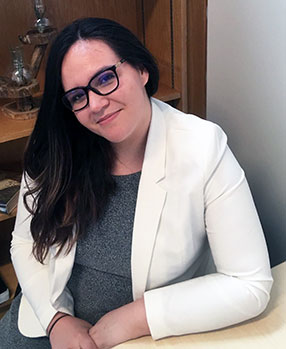
Danica Pawlick Potts
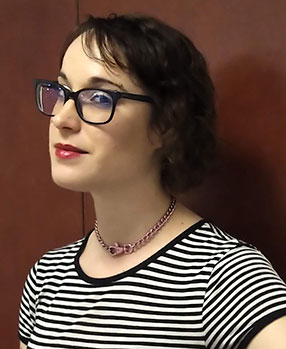
kirstyn seanor
Faculty of Information & Media Studies FIMS & Nursing Building, Room 2050 London, Ontario, Canada, N6A 5B9 Tel: 519-661-3720 Privacy | Web Standards | Terms of Use | Accessibility
FIMS Graduate Intranet
FIMS Faculty Resources
FIMS Events Calendar
FIMS Facebook Page

Course Catalog
Information sciences, phd.
for the degree of Doctor of Philosophy in Information Sciences
The Ph.D. program consists of the following components:
- a history and foundations of IS seminar (4 graduate hours);
- research methods (8 or more graduate hours);
- electives (36 graduate hours);
- field exam; and
- thesis (32 or more graduate hours).
Thus, a minimum of 48 graduate hours of coursework plus 32 graduate hours of thesis credit are required.
The School of Information Sciences (iSchool) offers programs of study leading to the Master of Science (M.S.), the Certificate of Advanced Study (C.A.S), and the Doctor of Philosophy degrees. Three Master of Science (M.S.) degrees are available. The M.S. in Library and Information Science (L.I.S.) prepares students for professional careers in all types of information organizations, including libraries. The M.S. in Information Management (I.M.) will prepare the students for information-intensive professional roles in a broad range of sectors. The Library and Information Science concentration of the campus-wide M.S. in bioinformatics program emphasizes multidisciplinary skills that are required for a career developing and managing information systems for the biological sciences community. The C.A.S. program provides the opportunity
- to study an aspect of information sciences in greater depth than is possible in the M.S. program,
- to refresh and upgrade one's professional training several years after completing a M.S. program, or
- to redirect one's career into a different area of library and information science.
School Librarian Licensure is available in conjunction with both the M.S. in L.I.S. and C.A.S. The Ph.D. is a research degree program.
Admission The general admission requirements of the Graduate College apply. Consideration is also given to language study and computer skills, relevant work experience, letters of reference, and evidence of leadership. International students must score at least 620 on the paper-based Test of English as a Foreign Language (TOEFL) (260 on the computer-based test; 104 on the iBT version); or 7.5 on each section of the IELTS. The M.S. in bioinformatics requires a strong background in information science including undergraduate-level computing and mathematics. The C.A.S. requires a master's degree in library and information science and a grade point average of at least 3.0 (A = 4.0) in the master's program.
School Librarian Licensure Candidates interested in the School Librarian Licensure program must first be admitted and enrolled as a degree-seeking student within the School of Information Sciences before their application to the School Librarian Licensure program is reviewed. Accepted students must successfully pass two Illinois State Board of Education testing requirements prior to registration for the final fieldwork experience.
Graduate Teaching Experience Although teaching is not a general Graduate College requirement, experience in teaching is considered an important part of the graduate experience in the Ph.D. program for those interested in faculty careers.
Facilities and Resources Among the major areas of faculty research are:
- community informatics
- data analytics
- data curation
- digital humanities
- digital libraries
- history of information
- information retrieval
- organization of knowledge and information
- privacy, security, and trust
- ethics and values for information
- youth literature, culture, and services
The iSchool's Center for Informatics Research in Science and Scholarship (CIRSS) conducts research on information problems that impact scientific and scholarly inquiry. The Center for Children's Books (CCB) provides a review and research collection of the newest literature for children and young adults. The Communications Office produces two high-quality publications, Library Trends and The Bulletin of the Center for Children’s Books. The staff of each of these units is available to students and faculty for consultation and guidance. A computer network with Internet connectivity is integral to teaching and learning activities. The University Library provides a vast reservoir of resources for all types of study and research in library and information science.
The School maintains an ongoing commitment to continuing education through conferences, institutes, workshops, and course offerings.
Financial Aid Financial aid may be available from the iSchool, the University Library, and elsewhere in the University in the form of graduate assistantships, teaching assistantships, research assistantships, and hourly paid work. Area libraries may provide pre-professional or hourly positions. Also, the iSchool offers a limited number of fellowships for which doctoral students tend to be favored over C.A.S. and master's degree students. Students in the joint program that do not hold a FLAS fellowship are eligible for, but not guaranteed, fellowship or assistantship support in the semesters in which they are enrolled in the iSchool. Any assistantship awarded to these students provides a waiver of the base in-state tuition and service fee as well as a stipend. Non-Illinois residents must pay the difference between in- and out-of-state tuition.
for the degree of Doctor of Philosophy Major in Information Science
For additional details and requirements, refer to the unit's Graduate Programs of Study and the Graduate College Handbook .
Entering with approved MS/MA degree
Other Requirements
Entering with approved BS/BA degree
- Definition: The iSchool’s PhD students will discover how complex, interdependent global systems— including informational, social, and technical —affect and are affected by the characteristics and behavior of individuals, communities, and institutions.
- Definition: The iSchool’s PhD students will acquire broad and deep expertise, including knowledge and skills, across subfields of information science. This includes the ability to engage with, plan, and conduct interdisciplinary research.
- Definition: The iSchool’s PhD students will apply their knowledge and skills to promote inquiry, discover solutions, generate new ideas, and communicate their research. This includes conducting independent and exemplary research, presenting their work in public settings, and publishing their work in peer-reviewed venue.
- Definition: The iSchool’s PhD students will develop a critical and reflective orientation toward such social and cultural differences as race, indigeneity, gender, class, sexuality, language, and disability. This includes the ability to conduct ethical and responsible research.
- Definition: The iSchool’s PhD students will build and sustain productive relationships to respond to information-centric, civic and social challenges at local, national, and global levels, creating positive impact in their communities. This includes the ability to convey their knowledge to others, e.g., by teaching or TA courses or workshops, and through outreach and service activities.
Graduate Degree Programs in the School of Information Science
- Bioinformatics: Information Sciences, MS (on campus & online)
- Information Management, MS (on campus & online)
- Library & Information Science, MS (on campus & online)
- Library & Information Science, CAS (on campus & online)
- Writing Studies
- Library & Information Science, MS and African Studies, MA
- Library & Information Science, MS and History, MA
- Library & Information Science, MS and Law, JD
- Library & Information Science, MS and Russian, East European, & Eurasian Studies, MA
School Librarian Licensure : available in conjunction with both the MS in LIS and CAS in LIS
School of Information Sciences Dean: Eunice Santos Program Contact: Katrina Hagler School of Information Sciences website iSchool Faculty 501 East Daniel Street, Champaign, IL 61820-6211 (217) 244-3432, (800) 982-0914 (within the US) ischool email
Admissions PhD in Information Science Admissions & Requirements Graduate College Admissions & Requirements
Print Options
Send Page to Printer
Print this page.
Download Page (PDF)
The PDF will include all information unique to this page.
2024-2025 Catalog (PDF)
A copy of the full 2024-2025 catalog.
2024-2025 Academic Bulletin
Library and information science, ph.d..
Students must complete an approved program of 54 credit hours of 700- and 800-level courses beyond the master’s level, including a minimum of 12 hours of dissertation preparation with a cumulative grade point average of 3.00 or above.
Learning Outcomes
- Students will understand theory development and research methods and their application in the field of library and information science.
- Students will demonstrate familiarity with seminal and contemporary scholarship involving major library and information science theories, problems, and practices.
- Students will understand the theory, practice, resources, and technologies of college-level instruction, and demonstrate proficiency in instructional techniques.
Ph.D. in Library and Information Science
Admission to the Ph.D. program is competitive and is based on the strength of the applicant’s educational background (with the expectation of an M.L.I.S. or master’s-level degree in a related field), standardized test scores, work experience, a statement of research interests, and a personal interview.
Application requirements for the Ph.D. program include:
- completing the Graduate School’s online application form, including a written statement describing the applicant’s anticipated research focus or interest and a nonrefundable $50 application fee;
- official transcripts from all colleges or universities attended;
- for international students whose native language is not English, an official report showing a minimum score of 570 (230 computer-based) on the TOEFL or a minimum overall band score of 6.5 on the IELTS Academic Course Type 2 exam;
- three letters of recommendation from persons able to comment on the applicant’s academic ability and scholarly potential -- letters of recommendation cannot come from family members;
- a resume or curriculum vitae outlining the applicant’s educational and professional achievements (sent directly to the School of Information Science);
- following the receipt of all documents listed above, an interview with a member of the graduate faculty.
Degree Requirements (54 Post-Masters Hours)
Core courses (15 hours), research methods (6 hours), qualitative methods (3 hours).
Chosen from advisor-approved options such as the following:
Quantitative Methods (3 Hours)
Isci electives (12 hours).
Chosen from advisor-approved 800-level seminars or 700-level courses appropriate to research interests and the production of work designed for scholarly publication or presentation.
Cognate Courses (9 Hours)
Chosen from advisor-approved courses from another discipline related to the student’s research interests (i.e., mass communication, sociology, education, anthropology, computer science, English, geography, history, marketing, philosophy, political science, psychology, public administration).
Comprehensive Written and Oral Examinations
Dissertation preparation (12 hours).
- Distance Education
- Examination Wing
- International Relations-MoUs
- Contact Directory
- ViksitBharat@2047

Roll of Honours
Governing bodies, secretariats, finance officer's secretariat, coe's secretariats, registrar's secretariat.
- Office of the Registrar
- Establishment Section – Teaching
- Establishment Section – Non-Teaching
- Academic Section
- Purchase & Stores
Find the Best Library and Information Studies Schools
Students who wish to become librarians generally must earn a graduate degree in the field.
Best Library and Information Studies Schools
- # 1 University of Illinois--Urbana-Champaign Champaign, IL
- # 2 University of North Carolina--Chapel Hill (tie) Chapel Hill, NC
- # 2 University of Washington (tie) Seattle, WA

Search Library and Information Studies Schools
Library and Information Studies Specialties
- Best Best Library and Information Studies Programs Schools
- Archives and Preservation
- Digital Librarianship
- Health Librarianship
- Information Systems
- School Library Media
- Services for Children and Youth
Need a jump start?
Sign up for a free U.S. News account to access our My Schools tool where you can save schools, track application statuses and get organized.
Graduate School Advice
Applying to Grad School

Paying for Grad School

About the GRE

Studying at a U.S. Grad School

More About Graduate Schools
Why it's hard to get into med school.
Doctor shortages are a growing concern, yet more than half of med school hopefuls don't get accepted.
A.R. Cabral May 6, 2024

Pros, Cons of Unaccredited Law Schools
Law schools not approved by the American Bar Association offer savings and convenience, but limited job prospects.
Gabriel Kuris May 6, 2024

An MBA and Management Consulting
An MBA is a major advantage when competing for management consulting jobs, experts say.
Sammy Allen May 2, 2024

Med School Access for Minority Students
Pathway programs and less emphasis on entrance exams can help more of these students enroll in medical school.
Cole Claybourn May 2, 2024

Completing Medical School in Five Years
Some students are taking an extra year when earning their M.D. Here's why.
Kate Rix April 30, 2024

Dealing With Medical School Rejection
Students who don't get accepted to med school can develop a growth mindset to improve and overcome the setback.
Kathleen Franco, M.D., M.S. April 30, 2024

Should I Get a Master's Before a Ph.D?
Do you need a master's degree to get a Ph.D.? No, but experts suggest considering these key factors before deciding.
Andrew Warner April 29, 2024


Should You Take the LSAT More Than Once?
Law school applicants disappointed with their LSAT score should carefully weigh a retake and answer these six questions.
Gabriel Kuris April 29, 2024

How to Win a Fulbright Scholarship
Strong Fulbright scholarship candidates convey a passion for cultures beyond their own, experts say.
Cole Claybourn and Ilana Kowarski April 26, 2024

What to Ask Law Students and Alumni
Speaking with current students and recent graduates of a law school can fill out your picture of what it's like to go there.
Gabriel Kuris April 22, 2024


- Anthropology
- Greek and Latin
- Information Sciences
- Mathematics
- Media and Communication Studies
- Modern Languages and Literatures
Department of Information Sciences
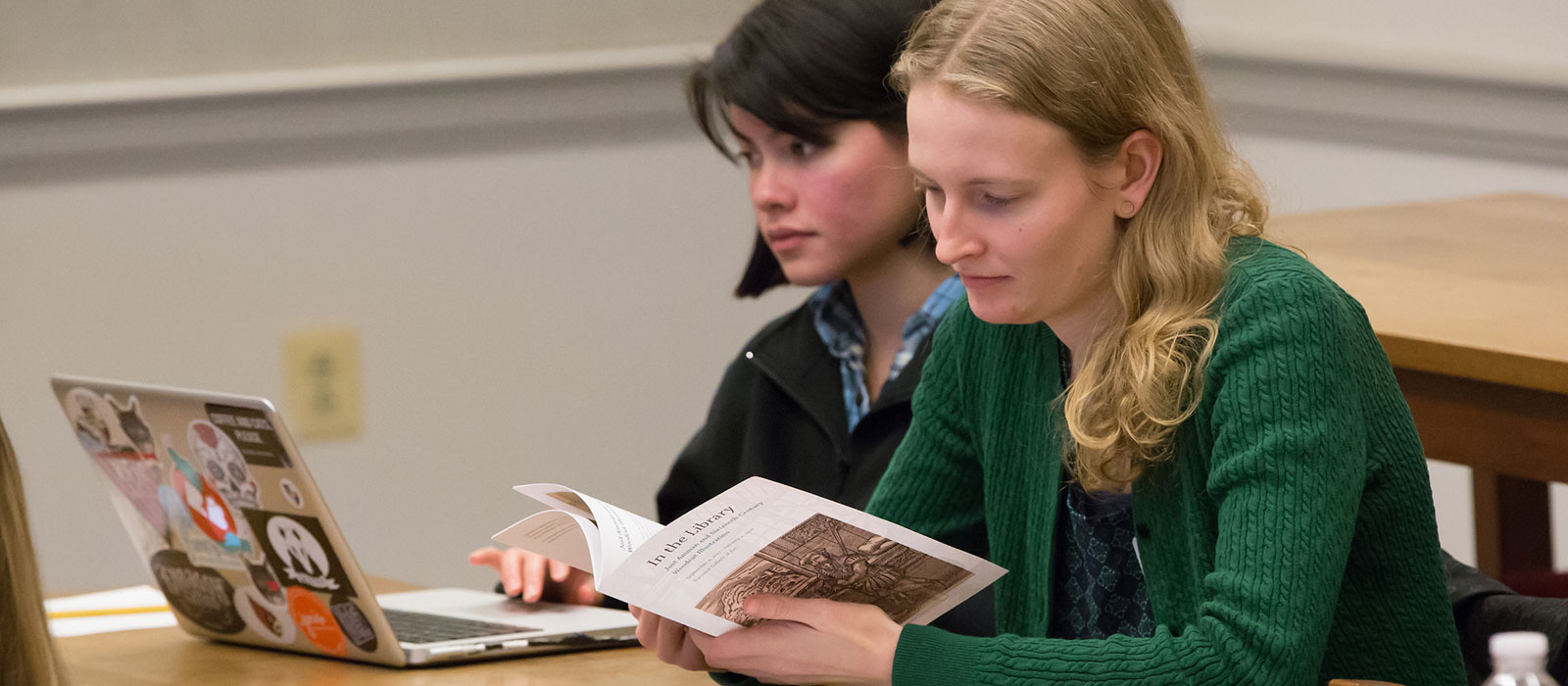
Apply for Graduate Programs in Library and Information Science
Transfer of credit and waiver of course requirements, frequently asked questions, tuition and financial aid.
- Student Ambassadors
The Admission Committee of Library and Information Science reviews each applicant's entire record. The committee considers numeric scores, background, talent, and other attributes that are needed by the information professions. Readiness to engage in academic work, analytic and conceptual thinking ability, strong writing skills, a commitment to the application of new techniques and concepts to the information professions are also considered.
Applications for the master's degree programs are reviewed on a rolling basis.
Apply for Graduate Programs
Application Requirements for Graduate Admission
Minimum required documents.
- A completed Catholic University online application (No fee is required.)
- Official transcripts from all post-secondary institutions (Unofficial transcripts can be used for the admissions review.)
- English proficiency test (Internationals students only)
Official transcripts and English proficiency scores must be submitted for full admittance to the University. Your official copies should be sent from the institution to [email protected]
For international students, a credential evaluation of your coursework will be provided free of charge by the University.
Recommended Documents
- Resume or curriculum vitae
- A letter of recommendation
- A professional goal statement
Questions? Email: [email protected] Phone: 202-319-5057
Once materials are submitted, please send a confirmation email to [email protected] .
Application Deadlines
- July 1 for international students
- August 15 for domestic students
- November 1 for international students
- December 15 for domestic students
Other Application Options
Post-master's certificates.
Any applicant who wishes to study as a post-master's student must apply as a non-degree student:
-Complete the online Application Form , accompanied by a $60 nonrefundable application fee. Upload your transcripts and send us your résumé . -Request that official transcripts be sent directly from the regionally accredited college or university that awarded your B.A., B.S., along with any transcripts from graduate work.
Non-Degree Students
A non-degree seeking student may take up to nine credits, which may be counted toward degree requirements if full acceptance to a degree program is later granted.
An applicant who does not wish to pursue the degree but wishes to follow courses independently must apply for admission as a non-degree student.
Admission as a non-degree student is limited to a single semester or summer session, unless renewed by the dean of the school for registration in subsequent consecutive semesters or summer sessions. Registration for consecutive semesters will be approved for students completing a certificate program. No fee is charged for such renewal. Non-degree students who subsequently wish to apply for degree study must file additional application documents and be accepted officially for degree study. Since the mere accumulation of courses will not satisfy degree requirements, one should consult the appropriate dean or department chair before enrolling.
To apply as a non-degree student:
-Complete the online Application Form , accompanied by a $60 nonrefundable application fee.
-Request that official transcripts be sent directly from all accredited colleges or universities that awarded your undergraduate degree, along with any transcripts from graduate work.
International Students
Library and Information Science requires that applicants from non-English-speaking nations whose previous education has not been at institutions of higher education in the United States certify their proficiency in English by submitting scores from the Test of English as a Foreign Language (TOEFL) or the International English Language Testing System (IELTS). A minimum score on the TOEFL of 580 (paper-based test) or 237 (computer-based test) or 92 (Internet-based test) is expected. On the IELTS, an Overall Band score of 6.5 or higher is required. A certified, translated copy of your transcript is needed if it is not in the English language. For more information, including deadlines for international applicants, see the International Students Admission page .
Scholarships
Kortendick scholarships, graduate library pre-professional (glp) programs.
The Graduate Library Pre-Professional Program, administered by The Catholic University of America Libraries with the cooperation of the Department of Library and Information Science, provides selected students in the Library and Information Science program with pre-professional work experience in the University libraries. The GLP Program allows students to complete their degree requirements within a two-year period and combines full-time, salaried work with part-time study. Participants receive the Graduate Library Pre-Professional Scholarship, which provides six credit hours of tuition per semester. The GLP program is administered by the Mullen Library (202-319-5055). More details and information on how to apply are posted on the Graduate Library Preprofessional (GLP) Program web page.
The Catholic University Law Library administers a Law Library Graduate Library Pre-professional program. For more information, see the Law Library GLP program webpage.
Candidates are welcome to apply to both GLP programs simultaneously, but separate applications are required.
Howard and Mathilde Rovelstad Scholarship
Catholic school teacher's tuition waiver.
This waiver covers one half of the regular graduate tuition for full-time teachers, administrators, librarians and guidance counselors who are employed by a Catholic elementary or secondary school while studying at Catholic University. The student must be in a degree-seeking. Read more about the discount
Third-Party Financial Aid
Visit campus.
Want to learn more about our program? Schedule a visit by contacting our department.
- Skip to Content
- Skip to Main Navigation
- Skip to Search

Indiana University Bloomington Indiana University Bloomington IU Bloomington

- Accreditation
- Program Assessment
- ILS Newsletter
- Funding Opportunities
- Plan a Visit
- Master of Library Science
- Master of Information Science
Ph.D. in Information Science
- Dual Degrees
- Specializations
- 4 + 1 Master’s Program
- Specialist in Library and Information Science
- Graduate Certificate in Information Architecture
- Undergraduate Minor in Intelligence Studies
- Career Prep
- Talks and Lectures
- Student Research and Travel Funding
- Faculty Directory
- Kaser Lecture Series
- People Directory
School of Informatics, Computing, and Engineering
Luddy School of Informatics, Computing, and Engineering
Department of Information & Library Science
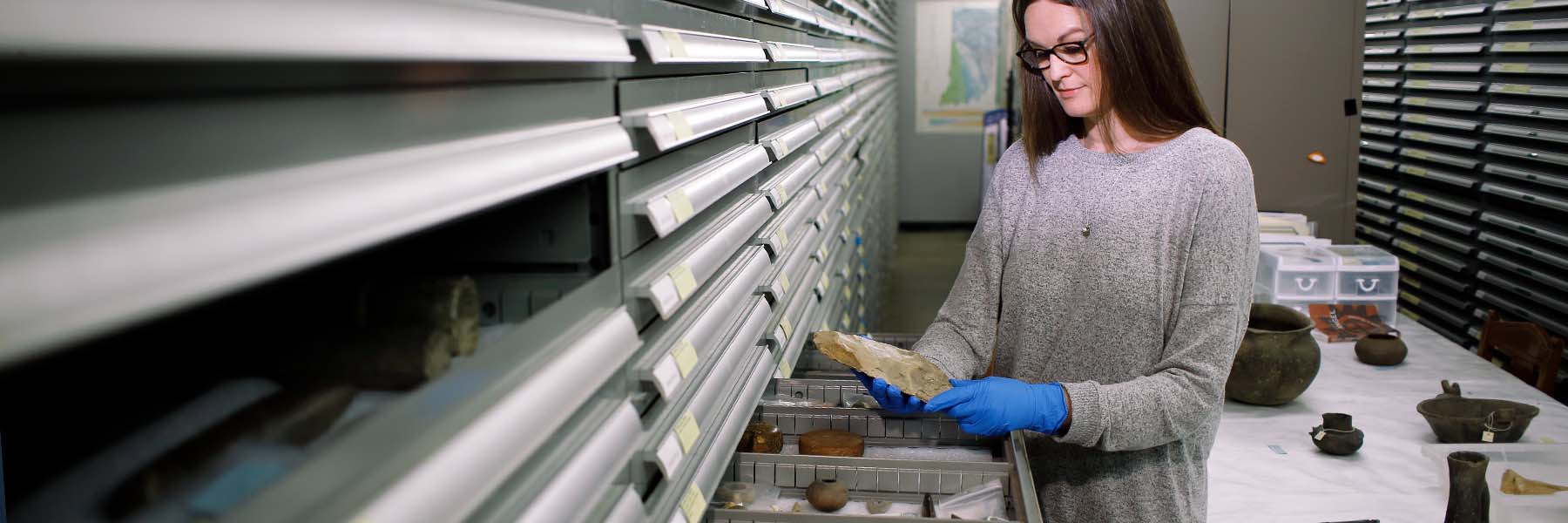
Advance the field of information technology
The Doctor of Philosophy (Ph.D.) in Information Science at IU Bloomington is one of the oldest, continuously running information science doctoral programs in the nation. Our mission is to train the next generation of information scientists—professionals who want to understand, predict, and advance the ways in which people use information systems and communication technologies.
We welcome students from all over the United States and world. Most plan to enter academia. Our alumni have worked at institutions such as the University of North Carolina, UCLA, the University of Hawaii, Kent State University, and the University of Alabama. Other graduates go on to work for organizations like NASA, the Langley Research Center, and Oracle.
Learn about the Ph.D. minor
ILS welcomes doctoral students from all disciplines to consider a minor in information science.
Please send inquiries to [email protected]
Learn how to apply
Begin your online application
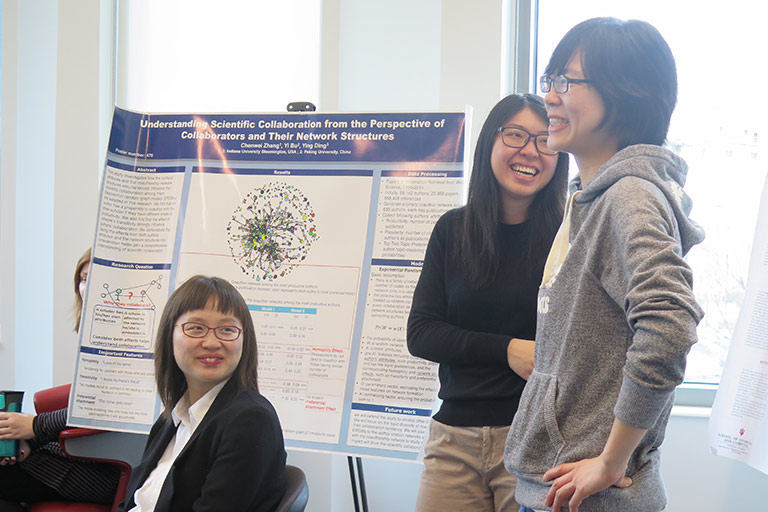
Generate original research on the topics that interest you most
The Ph.D. in Information Science is designed to prepare you for research and teaching in academia. Your core requirements will help you develop a strong understanding of the research process and what constitutes scholarly research. You’ll also learn to identify and conceptualize significant research problems so that you may undertake new research initiatives and contribute new knowledge to the field.
We encourage you to research the ideas and questions that fascinate you most. Recent areas of concentrated study include, but are not limited to:
- Biodiversity information and culture
- Computer-mediated communication
- Critical information and library science
- Cultural analytics
- Cultural heritage informatics
- Data and text mining
- Digital and computational humanities
- Digital curation
- Digital libraries
- Documentation
- Gender and technology
- History of the book, readership, and publishing
- Knowledge organization (KO), including classification, ontologies, and metadata
- Knowledge sharing
- Online communities
- Philosophy of information and information ethics
- Records management
- Social informatics
- Social media mining
- Technology and diversity
- Text encoding and digital editions
Regardless of your specific career interests, you will graduate prepared to work as a professional researcher, teacher, and consultant.
Recent Ph.D. dissertations
Discover what our students are researching. Review a list of ILS Ph.D. dissertations dating back to 1968.
See dissertation list
Review your program requirements
Degree requirements for the Ph.D. in Information Science are listed in the University Graduate School academic bulletin.To review your specific requirements, choose the bulletin that represents the year you started, or plan to start, your Ph.D. program.
2023-24 bulletin
2022–23 bulletin
2021–22 bulletin
Ways to fund your education
ILS offers funding opportunities for incoming Ph.D. students , and current Ph.D. students .
Adjunct teaching opportunities are also available as a form of financial assistance.
If you’re interested in teaching contact your committe chair and the chair of the doctoral committee.
Choose a minor
All Luddy School of Informatics, Computing, and Engineering doctoral students are required to complete either a minor within the school or an approved minor outside the school. Your minor should relate to your research, as determined by your advisory committee.
See Luddy minors
To learn more about Ph.D. minors outside of the Luddy School of Informatics, Computing, and Engineering, visit the websites of IU Bloomington’s 16 degree-granting colleges and schools .
Find other ways to meet the Luddy Graduate Team
Department of information & library science resources and social media channels.
- Service Requests
- Luddy Intranet
, you will have a better experience.
Search results
Show site search
Stäng söket

Search the entire webpage
Search suggestions.
- The Swedish School of Library and Information Science
- The Swedish School of Textiles
- Business and IT
Library and Information Science
- The Human Perspective in Care
- Educational work
- Resource Recovery
- Textiles and Fashion
- University of Borås
- Doctoral education
- Our doctoral programmes
Doctoral studies are conducted at the University of Borås within the field of library and information science. This includes the processing of meaningful information in a broad sense and how this can be arranged, made searchable and accessible, as well as conveyed by various technologies and information services.
The research deals with the conditions and methods for individuals and organisations when it comes to obtaining the required/relevant information for various activities, education, or experiences. The area focuses on Library and Information Services as well as how individuals and organisations seek, use, and access information. These issues are studied at both the micro and macro level; also included are cultural and information policy issues.
Since the 90s, the University of Borås has offered doctoral education studies in library and information science. For years, this was in collaboration with the University of Gothenburg; since 2010, the university has had its own rights to grant doctoral degrees.
From the beginning, there has been a strong research environment and doctoral education programme at the University of Borås, which has meant that we have, for some time, been able to offer a complete education and research environment within library and information science. The doctoral programme is the largest and oldest in the area in Sweden. Since its inception, the doctoral programme has generated nearly 40 doctoral theses altogether.
The research environment in Library and Information Science in Borås includes the following more specific subareas and research groups:
- Information Practices (including information retrieval, information usage, and strategic information management)
- Digital resources and services within culture and information (including, among others, the organisation of knowledge, bibliometric IR, and information management)
- Library, culture, and society (including reading research as well as cultural and information policy)
To lead the research and the doctoral education programme, there are seven professors full-time or part-time (including two Emerita/Emeritus), four associate professors, and a number of senior postdoctoral researchers. There are 15-20 doctoral students currently at the university in this field.
The doctoral programme is headed by a senior scientific leader and a Research Education Committee with participation from the university's Research and Education Board. A Director of Studies is also associated with the doctoral education programme.
Doctoral education takes four years full-time, yet it is usually the case that doctoral students are involved in teaching or administrative work for 20% of their employment, bringing the total to five years to receive a doctorate. The programme consists of 90 ECTS of doctoral courses and 150 ECTS credits for one's own research.
The final work can take the form of a monograph thesis (dissertation) or a so-called compilation thesis in which articles are combined with an introductory and summarising chapter, a "kappa." The thesis is defended at a public defence. A principal supervisor and at least one assistant supervisor lead, support, and challenge the doctoral student during the study period.
In order to be admitted to the doctoral education programme within the library and information science, you must have an advanced degree in the field or within a related discipline judged relevant for the educational programme. The admissions process means an examination in which candidates are assessed based on ability and conditions required to complete the programme. Doctoral students must have good capabilities with the English language; for most of the posts, it is also necessary to be fluent in Swedish or another Scandinavian language.
Doctoral education in Sweden is free of charge for the student. However, doctoral students' living costs must be guaranteed either by a doctoral studentship (employment as a doctoral student) at the University of Borås or employment at another institution, organisation, authority, or company.
Director of Studies: Ola Pilerot , Professor
General Syllabus Library and Information Science, pdf
Linked images

Pursue doctoral studies with us
Doctoral studies are primarily conducted through doctoral studentship, a form of employment. This is where you can see available positions.

Research in Library and Information Science
Find research projects, research groups, publications and contact information for researchers within the area of Library and Information Science.

The research school ReSource
ReSource - Transforming Reading and Source Criticism in Digital Cultures, is funded by the Swedish Research Council (2023-2026).
Saved educations
Saved courses/programmes.
Required fields are marked with an asterisk ( * ).
Colorado State University
Vice president for research, school of materials science and engineering , admissions information, masters plan a and phd:.
January 5th : Application deadline for fall admission.
September 1st: Application deadline for spring admission.
Masters plan B (not considered for funding)
Rolling admission
How to Apply
Choosing an Advisor
Curriculum and Degree Options
The Colorado Experience
Guide to Applying to Grad School

Fall Virtual Information Sessions (30 minutes)
September 28, 8a and 6p MT October 26, 8a and 6p MT November 30, 8a and 6p MT
Minimum Requirements:
The School of Advanced Materials Discovery believes in reviewing your application holistically. Each piece of your application informs our admissions committee about what you can bring to the program and how our program can accentuate your skills and potential. We will review your application with unofficial transcript and/or English proficiency test score copies, but the application portal says official copies are needed. If the committee wants to recommend you for admission, we will require official copies at that time. Read the frequently asked questions section below for more information.
Currently, our program does not require the GRE. Our admitted student GPA average is a 3.3 GPA (as of FA23). Although not required, a 3.0 GPA or equivalent is recommended. Students with a GPA between 2.8 and 3.0 or equivalent can be recommended for non-provisional admission. If you have below a 2.8 GPA, refer to the Access Admission Pathway . We recommend you request letters of recommendation from individuals that know you well. Write a personal statement that tells us what may not be visible in your application. For tips on writing your personal statement, click here .
A Materials Science and Engineering (MSE) Bachelors of Science is not required for admission to our MSE Graduate Program. However, our admissions committee requires you demonstrate knowledge of the following subjects/courses :
- One year of calculus-based physics
- One year of collegiate chemistry for the sciences
- Calculus and differential equations
The commitee also recommends you demonstrate knowledge of: Materials Science, Materials Science & Engineering, Matlab or other coding program.
Once admitted, the admissions committee may recommend/require additional courses to ensure all students are successful in our MSE program. Additional courses may be recommended and/or required of the student’s thesis/dissertation committee as well.
Please refer to our frequently asked questions section below for additional information.
Admissions contact: Carolina Bañuelos Phone: 970-491-4879
Frequently Asked Admissions Questions
At this time, we have a limited number of application fees we can cover. If you do not qualify for one from the graduate school ( check here ), the department will cover the fee a fter the application review if both of the following are true :
- Application is complete with unofficial or official documents
- Committee wants to recommend you for admission
IMPORTANT: As long as we have all your materials by the due date (official or unofficial), we will review your application. You will receive automated messages that your application fee is due or that your application is incomplete, but we cannot turn those off. The system marks it as incomplete if there are unofficial documents and if fee is unpaid. Rest assured we will still review your application. If we do not move your application forward for admission, you won’t need to worry about the fee for our degree program application. This only applies to the MSE degree program application.
Contact the program manager if you have additional questions: ( [email protected] ).
- All PhD and MS-thesis applications (domestic or international) are considered for funding, no additional application for funding is required.
- Our program offers financial support in the form of Graduate Teaching Assistantships, Graduate Research Assistantships, and Rotating Graduate Assistantships. Assistantships cover all of tuition and provide a monthly stipend.
- No funding is offered for the MS-coursework only degree (seminar, paper, project option).
- No, but MS-Thesis and PhD applicants must mention 2-4 faculty they are interested in working with in your application and/or personal statement. Check out our faculty page and research areas for more information.
- Regardless of residency status, you are eligible for funding when applying to PhD or MS-thesis degree programs.
- There is no additional funding application required.
- We do not offer funding for the MS- coursework only (seminar, paper, project)
- No. We do not require GRE for our application.
- Yes you can apply. We can recommend students who have between a 2.8 and 3.0 (or equivalent) for admission. The graduate school has the final say on admission.
- For applicants with a GPA below 2.800, the Access Admission Pathway ( see Access Admission Pathway section ) provides an admission pathway that balances accessibility with individual student success for applicants who have completed six credits of regular, graduate-level coursework at CSU and received a B or better in each individual course. Applicants who qualify for Access Admission will be provisionally admitted and immediately placed on academic warning.
- Regardless of citizenship , applicants may be required to demonstrate proof of English language proficiency if they do not have a degree from an institution where the primary language of instruction is English.
- Information about minimum test scores and a list of who is exempt from submitting English proficiency test scores is found here.
- CSU requires that proficiency in the English language be demonstrated either by the TOEFL, IELTS, Duolingo, or and PTE Academic tests prior to admission.
- TOEFL minimum score – 550 (paper based), 80 (Internet based)
- IELTS minimum score – 6.5
- Duolingo minimum score – 120
- PTE minimum score – 58
Official scores, taken within two years prior to admission, must be submitted directly from the testing agency.
- General IELTS
- IELTS indicator
- TOEFL Essentials
- TOEFL My Best Score
- PLEASE READ THE FOLLOWING CAREFULLY : the application portal will say you need official transcripts and official English language proficiency test scores, but WE WILL review your application with UNOFFICIAL copies if we have unofficial copies and your other application materials are submitted by the due date. You also do not need to pay for your fee for us to review your application.
- Important note: If the committee wishes to move your application forward for an admission recommendation, we will require official documents at that time and will cover your fee after we see official documents submitted.
- If we do not move your application forward for admission, you do not need to worry about the fee for our degree program application. This only applies to the MSE degree program application.
- A guide to submitting your transcripts can be found here.
- An official transcript paper copy that is sent via mail to graduate admissions:
Colorado State University – Office of Admissions
1062 Campus Delivery
Fort Collins, CO 80523-1062
- An official transcript copy sent from the university through a secure service like TrueCopy or World Education Services (WES) will count as official. These must be sent to ADM GradProcessing at [email protected]
4-6 weeks after the due date . The committee does not review applications until we have a complete applicant pool. We do not have an early admission for early decision timeline. Please be patient with our process. We take our time and review your application as holistically as possible and have several “stops” in the process.
Submit Application Materials:
After submitting your online application and paying your application fee, begin submitting your supporting materials to complete your application.
- Upload a variety of supporting documents directly to your application.
- To submit official transcripts, contact your previous institutions to request they submit official transcripts to Colorado State University (use institution code 4075).
- To submit test scores, contact the testing agency to request that scores be sent to Colorado State University (use institution code 4075).
- For any documents that cannot be uploaded, submit paper copies directly to the Office of Admissions at:
Graduate Admissions Colorado State University – Office of Admissions 1062 Campus Delivery Fort Collins, CO 80523-1062
Check Your Application Status
View the status of your application at any time to ensure your application checklist is complete or check on updates. This new online application status is only available to applicants for Fall 2016 and beyond.
Health Science Center
What Can we help you find?
Popular Searches
- Academic Calendar
- Study Abroad
- Majors & Minors
- Request Info
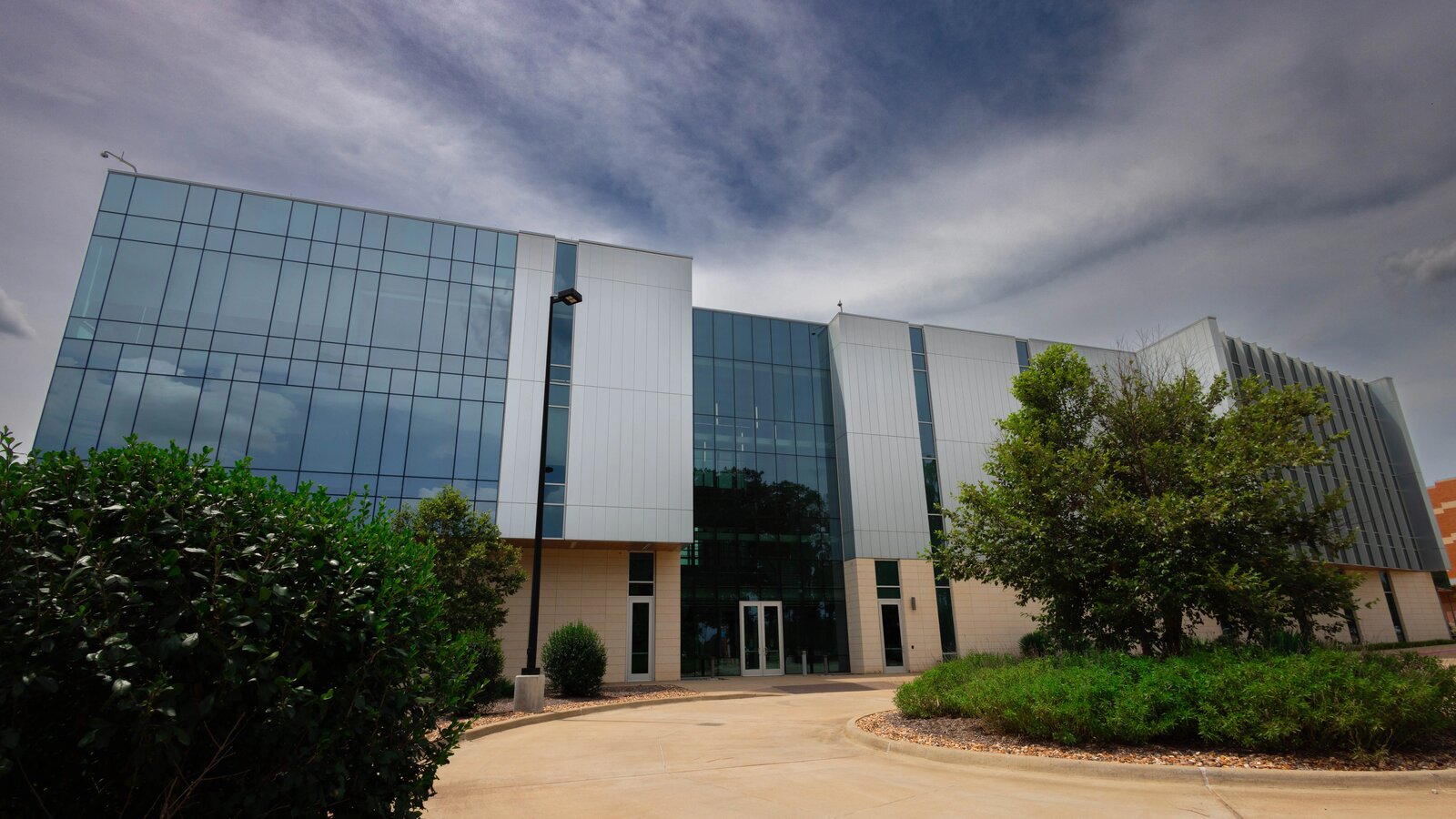
UT Tyler Health Science Center
Build a healthier tomorrow.
Home to the region’s only academic medical center, The University of Texas at Tyler Health Science Center is one of the five campuses of UT Tyler. Two of UT Tyler’s four health-related schools have a presence on this campus: the School of Health Professions and the School of Medicine.
Campus History
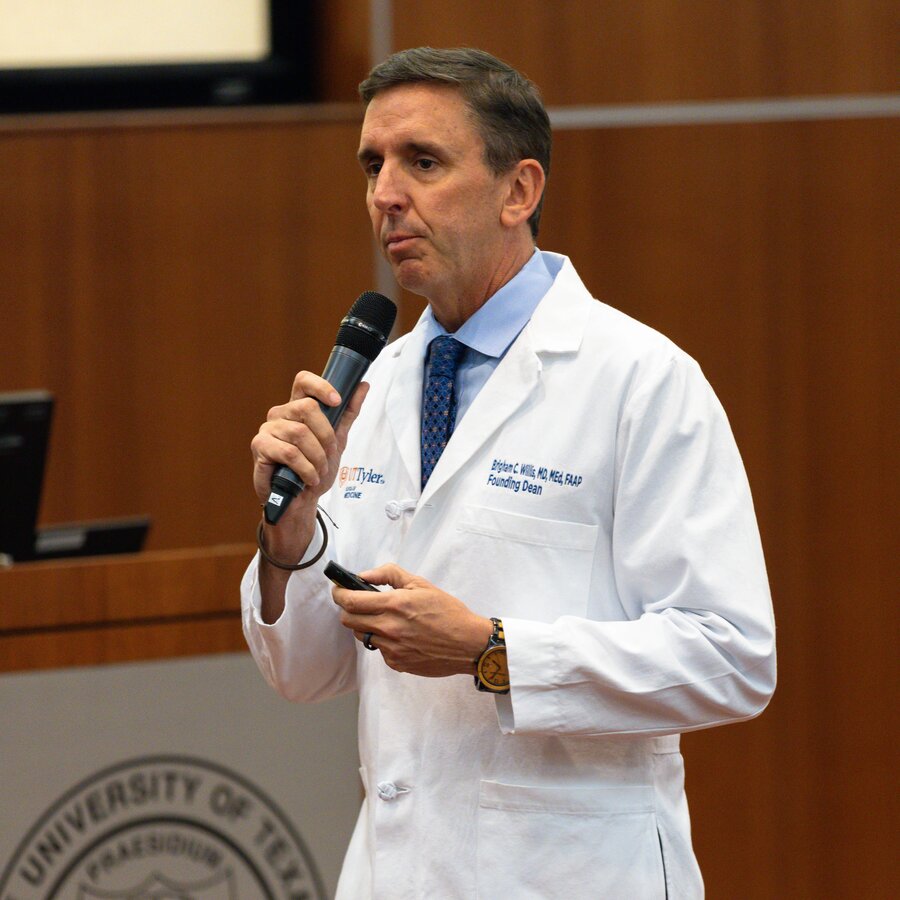
Our Beginnings

Joining the University of Texas System
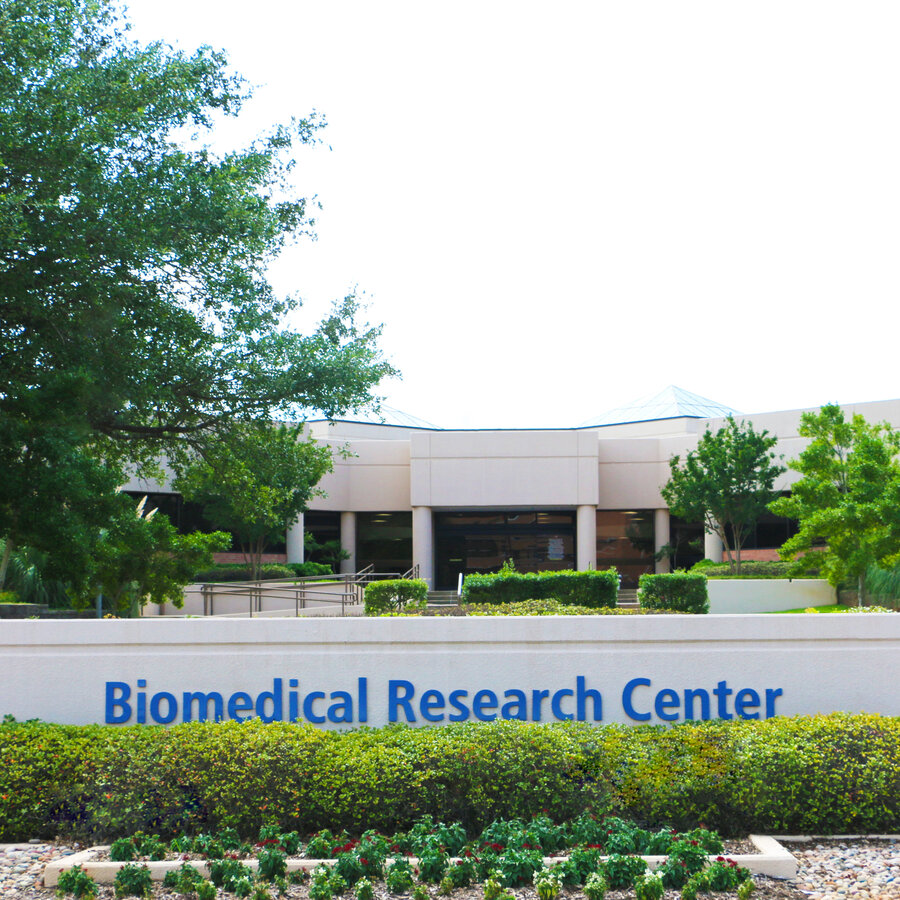
A Name Change
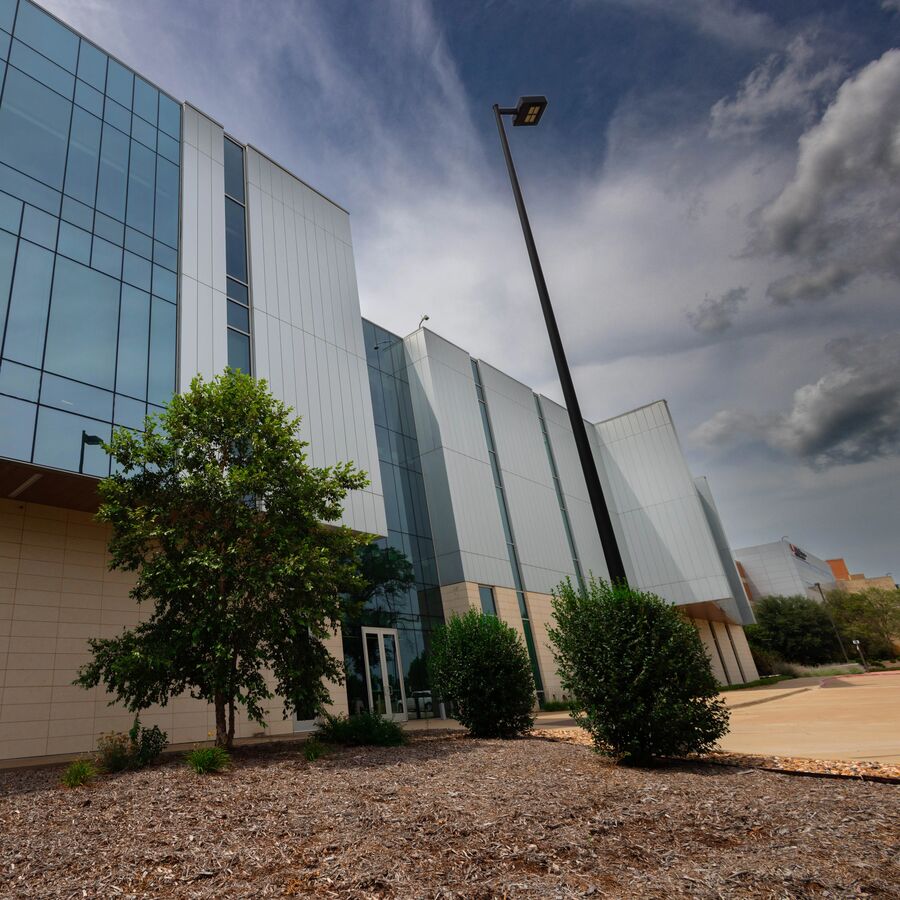
New Programs

Campus Programs and Facilities
The UT Tyler Health Science Center facility offers an array of crucial medical and healthcare education resources, fostering an environment dedicated to excellence in education. From cutting-edge simulation labs to dedicated research spaces, every aspect of the UT Tyler Health Science Center is designed to enhance the educational experience. This dynamic campus is not just a hub for learning; it’s a catalyst for progress in healthcare education and a testament to UT Tyler's commitment to shaping the future of healthcare in the East Texas region.
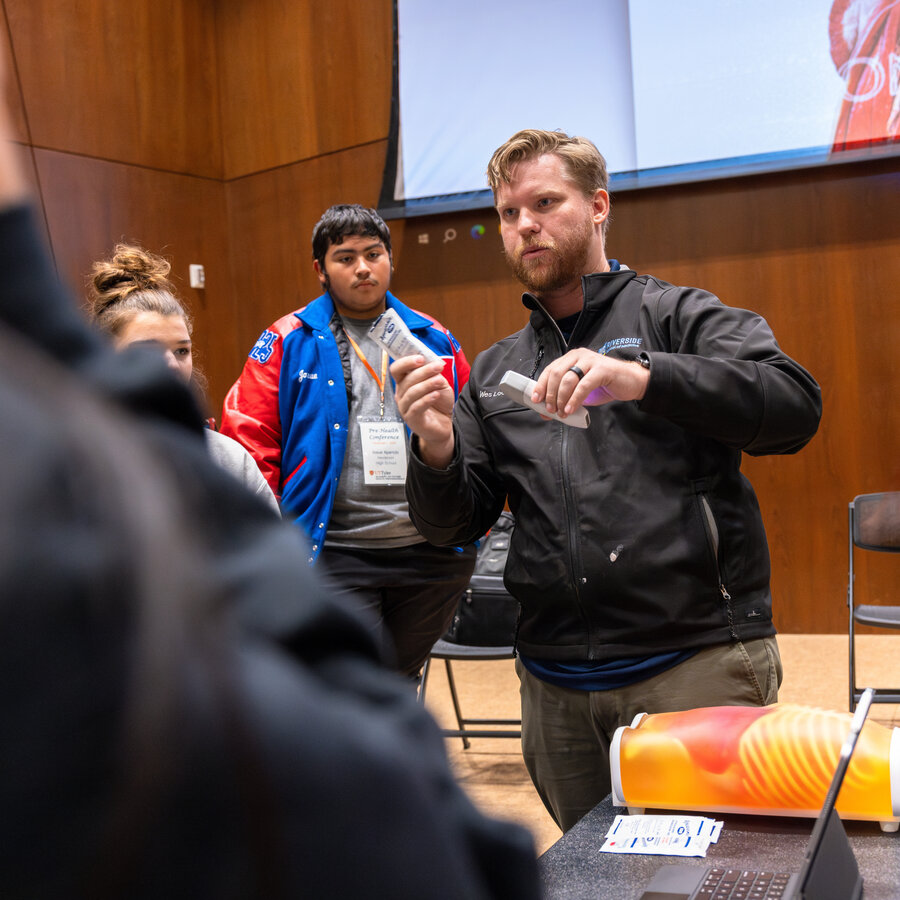
Office of Health Affairs
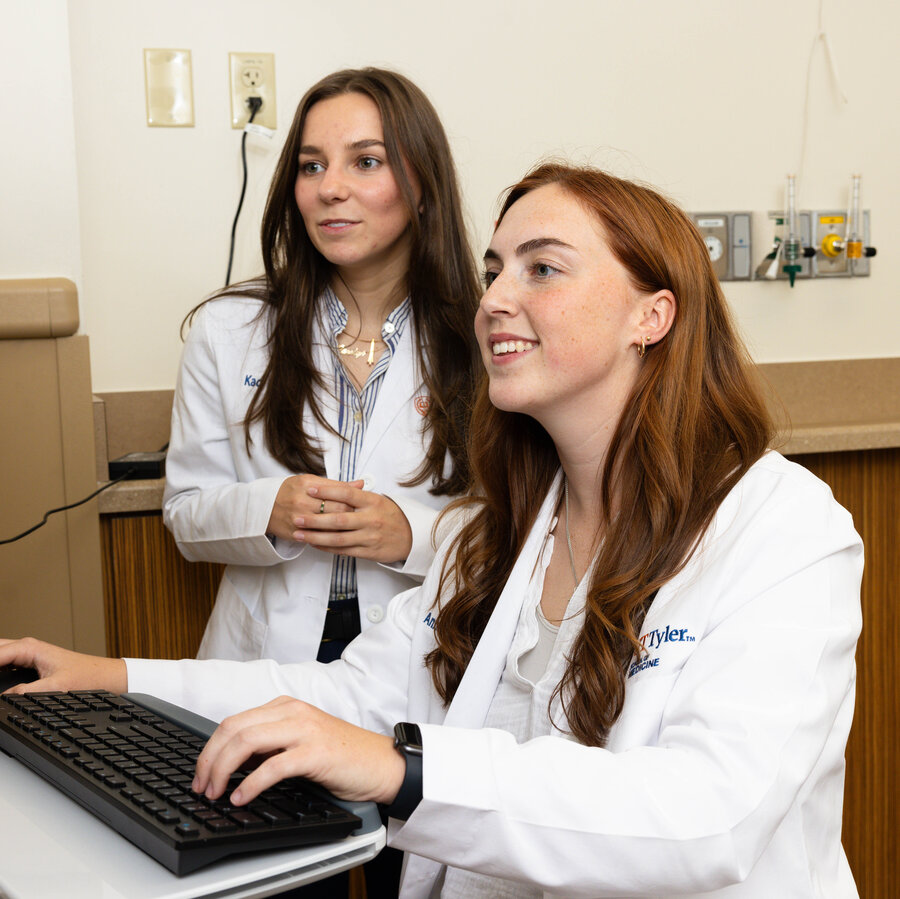
School of Health Professions
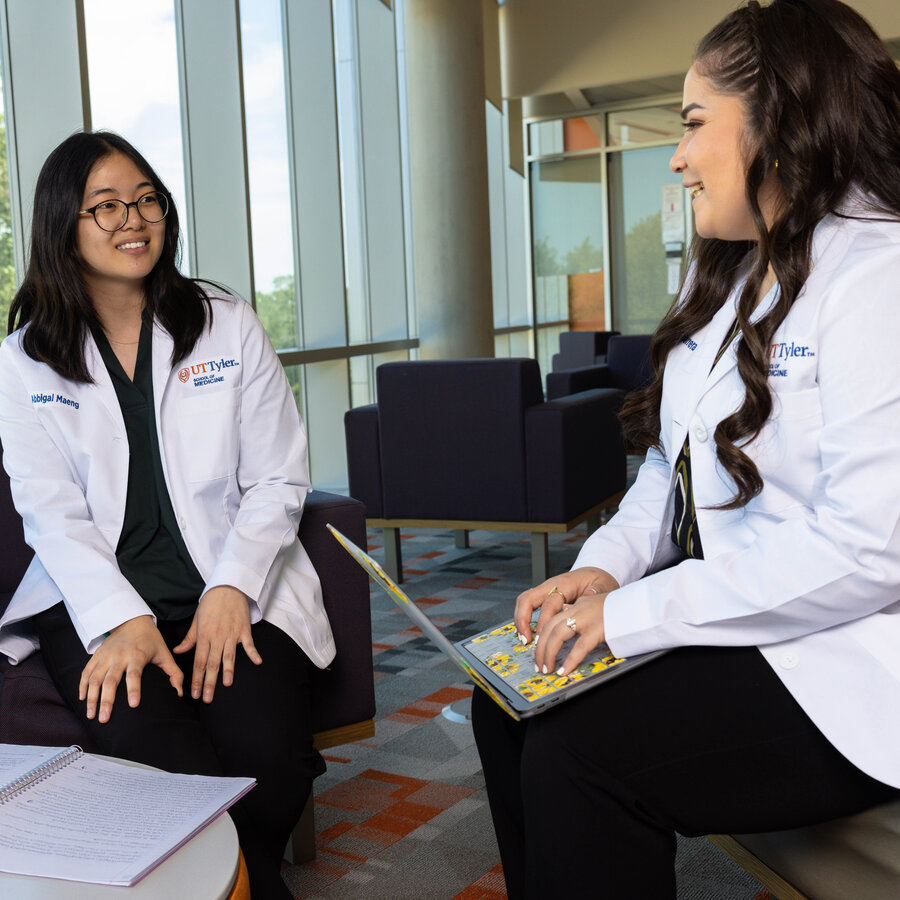
School of Medicine
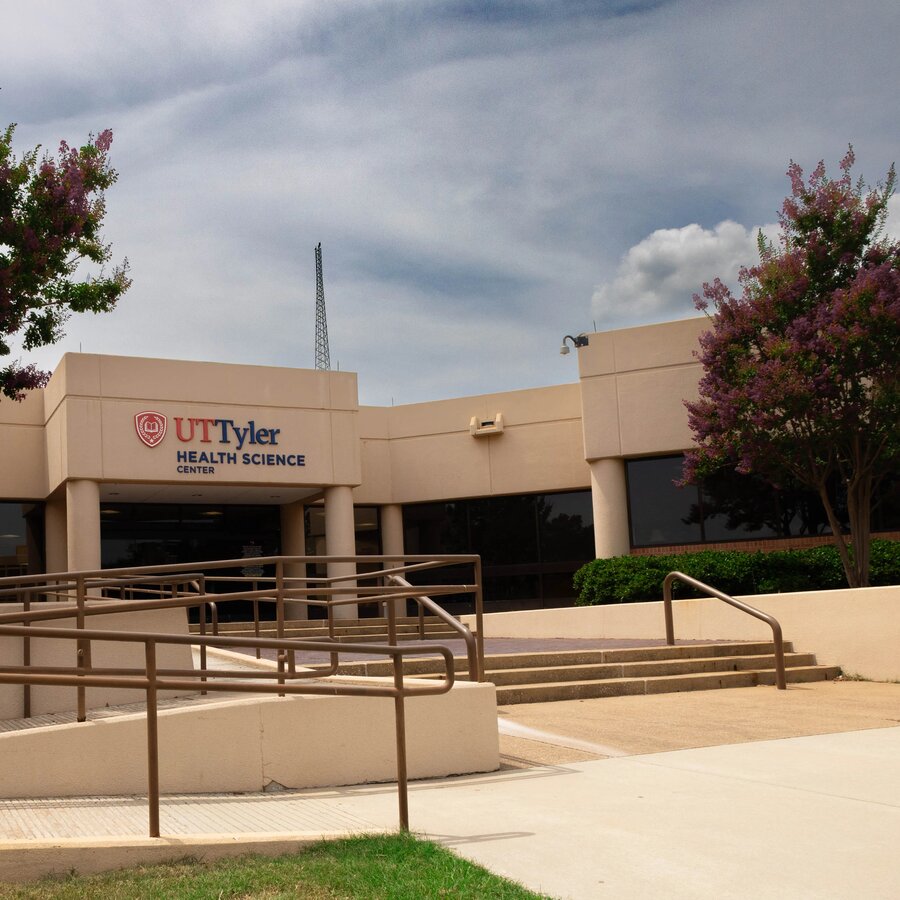
Center for Biomedical Research
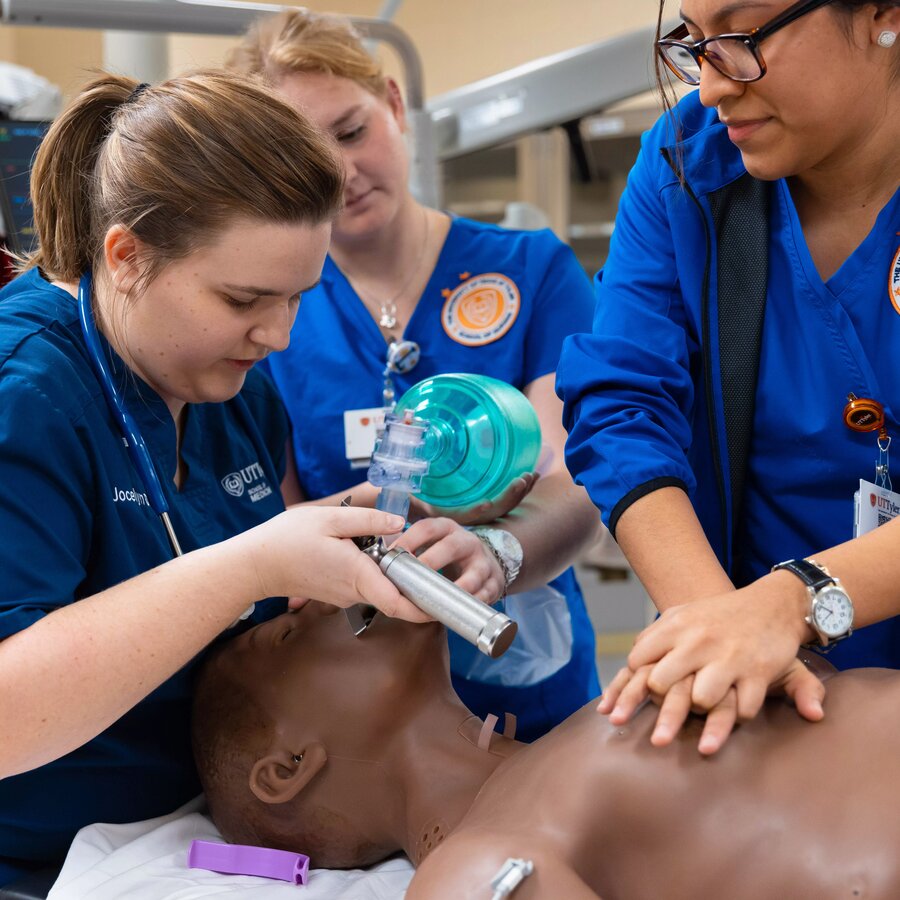
Simulation in Medicine and Immersive Learning Experience Center
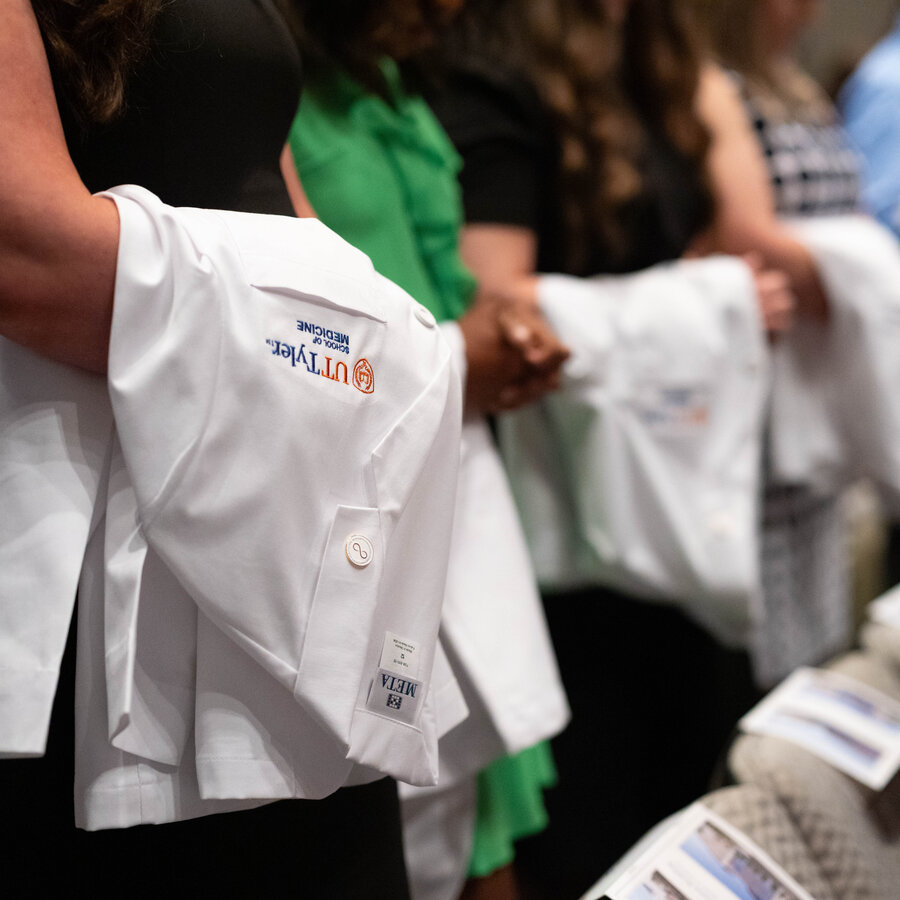
Watson W. Wise Medical Research Library
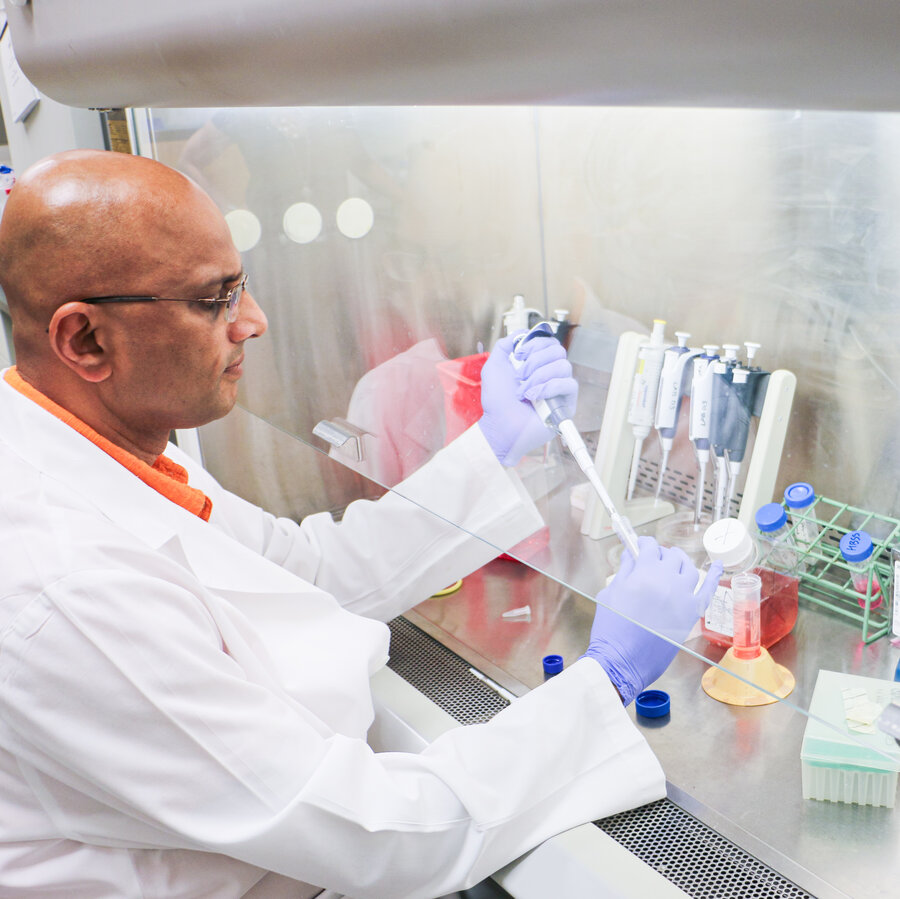
Public Health Laboratory of East Texas
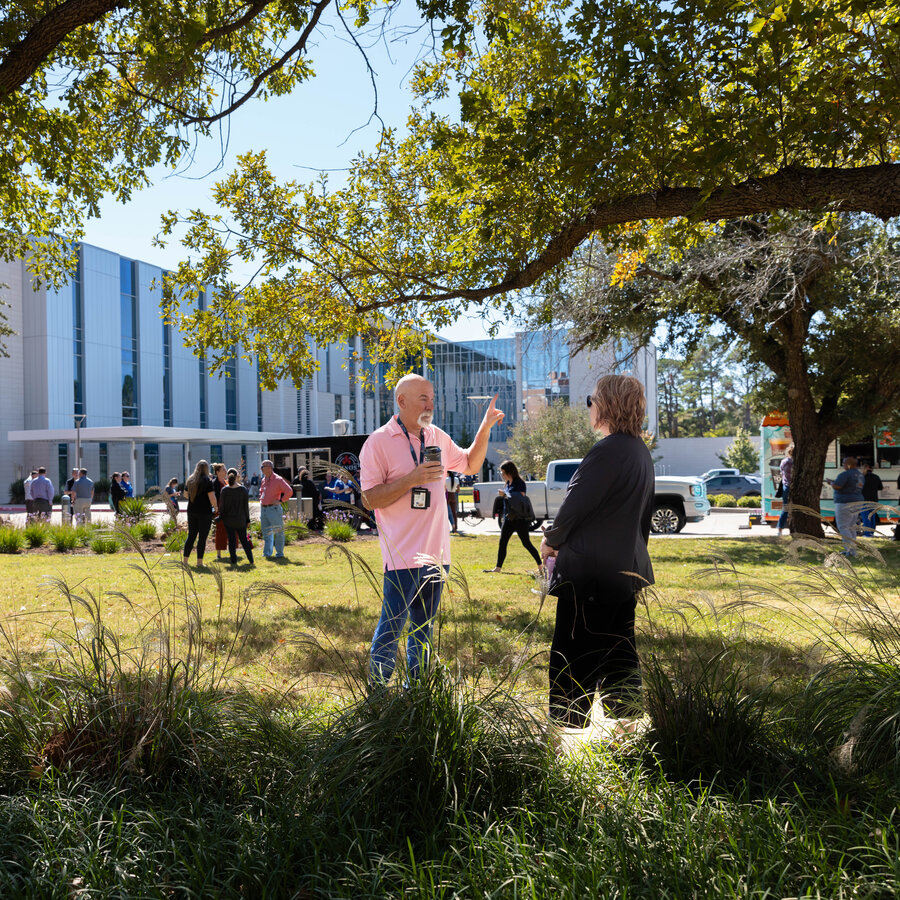
UT Health North Campus Tyler (UTHET)
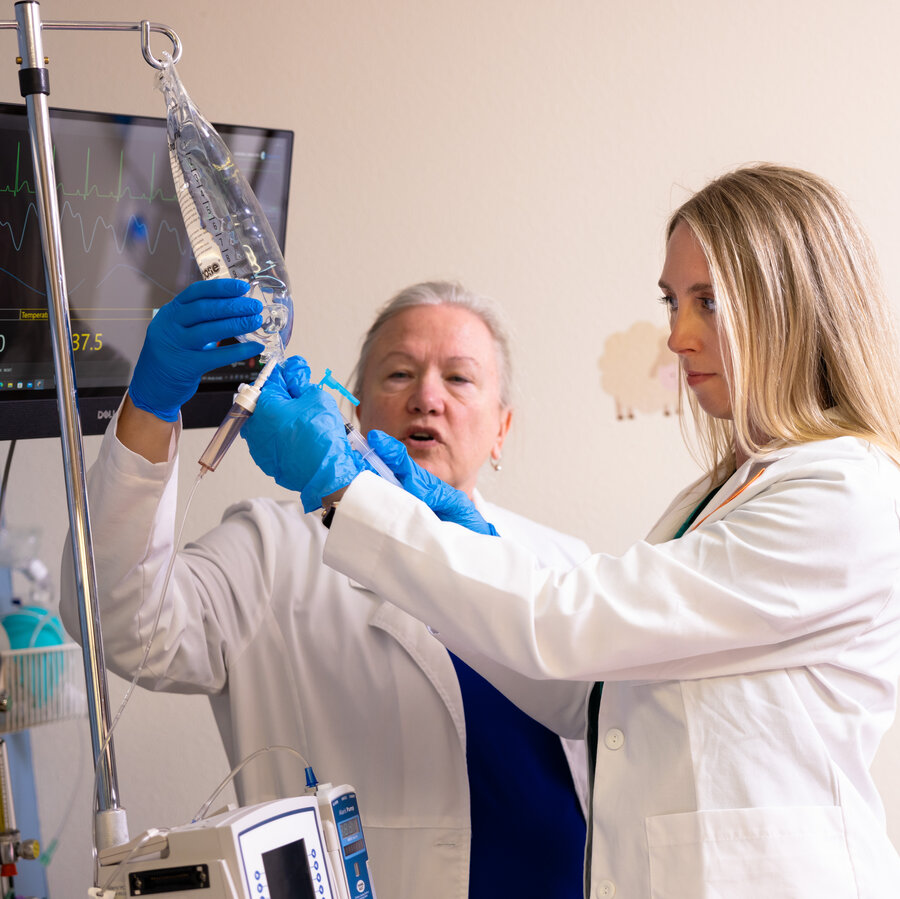
HOPE Cancer Center
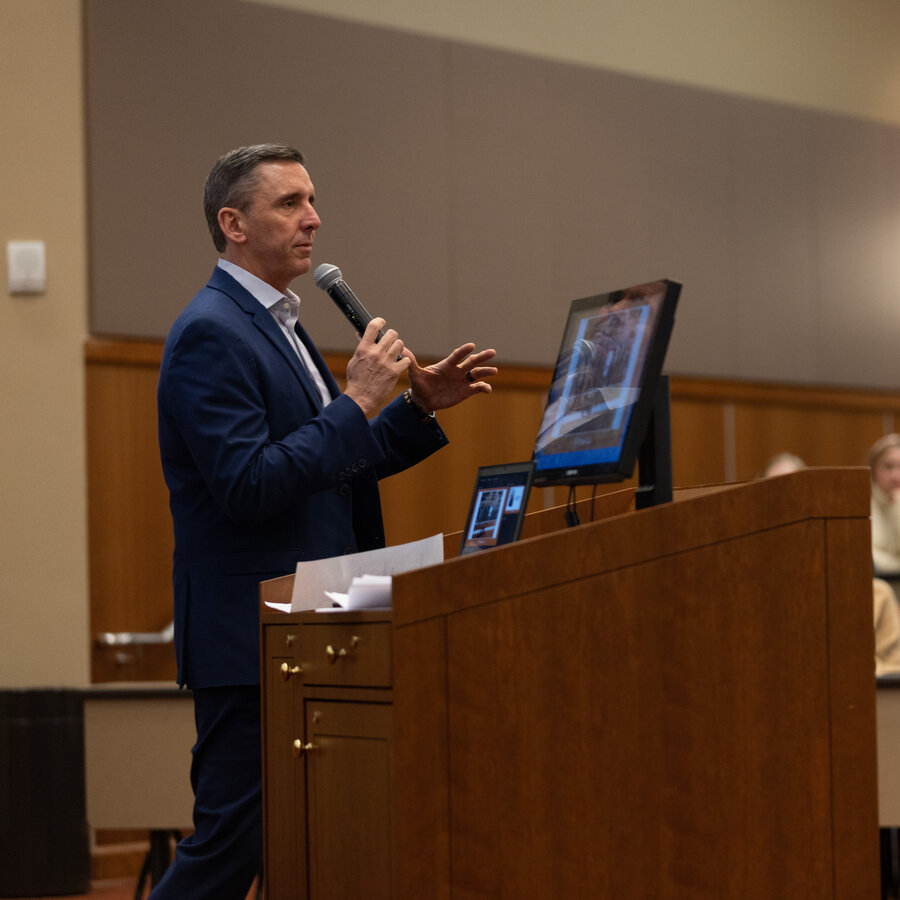
A Regional Leader in Health Research
UT Tyler pioneers solutions to improve health. Several research centers, including the Center for Mycobacterial Treatment and Discovery and the Center for Biomedical Research, are housed on this campus. The centers build on our history of innovative treatments for lung disease and focus on the health concerns of rural populations through projects funded by agencies like the National Institutes of Health and the Centers for Disease Control and Prevention. Students benefit from hands-on research opportunities and instruction informed by the latest developments in the field.

Dr. Maolin Lu
Assistant Professor of Cellular and Molecular Biology
Meet Professor Lu
Community Outreach and Engagement
Ut health east texas.
In its regional network of hospitals, clinics and other facilities, UT Health East Texas delivers world-class care to thousands of patients each year while conducting clinical trials and training the next generation of professionals through UT Tyler’s unique programs. The UT Tyler Health Science Center is home to UT Health North Campus Tyler .
Public Health Programs
Faculty, staff and students at the UT Tyler Health Science Center campus connect their expertise with local community needs to assist traditionally underserved populations through an array of health and outreach programs, including behavioral health telemedicine services for rural populations, cancer screenings, parental education, lifestyle changes and more.
Regional Health Resources
To strengthen regional healthcare, we train community health workers, promote healthcare careers in underrepresented communities and support community health education and development efforts.
Connect With Us
The university of texas at tyler health science center.
Phone: 903.877.7777
We’re pioneering the future of healthcare in East Texas. Find out how you can join us.
11937 U.S. Hwy. 271 Tyler, TX 75708-3154
Early Childhood Education Pre-Primary Endorsement Certificate

Our online one-year program to add 3-6 license onto a current K-6 or K-12 teaching license.
Taught within the Early Childhood Education program, you will learn about foundational pedagogy for ECE and how to meet the needs of diverse learners in the 3-6 setting.
Grounded in Montessori Philosophy and Practices to Become a More Effective Classroom Leader
Gain real-world experience to prepare you to develop your teaching pedagogy with an individualized, anti-bias and anti-racist teaching approach influenced by Montessori philosophy that honors the whole child.
By engaging in critical self-reflective activities, you will become an ethical and influential educational leader as informed by the philosophy of Maria Montessori and her vision of peace and social justice to develop a greater understanding of themselves, children, and the world.
Courses are housed within the Early Childhood Education program and many are taught from the elementary point of view. Our education program faculty bring a lot to the learning experience and are here to guide you throughout the program.
Program at a Glance
Classes meet: Online
Start: Fall Term
Time to completion: 1 year
Cost per credit: 18
Tuition per credit: TBD
Total tuition: TBD
Rates are subject to change each June 1.
Tuition and fee information
Accreditation
MN State licensure through PELSB (Professional Licensing & Standards Board)
Career Outcomes
Apply for admissions.
Application requirements, deadlines, and instructions.
Transfer Students
Find out how your courses will transfer with a free custom transfer evaluation.
Information Session
Ask questions, meet faculty, and more.
Financial Aid
Apply for aid from federal and state governments, University grants and scholarships, and educational loans.
Related Programs

News from the School of Humanities, Arts, and Sciences
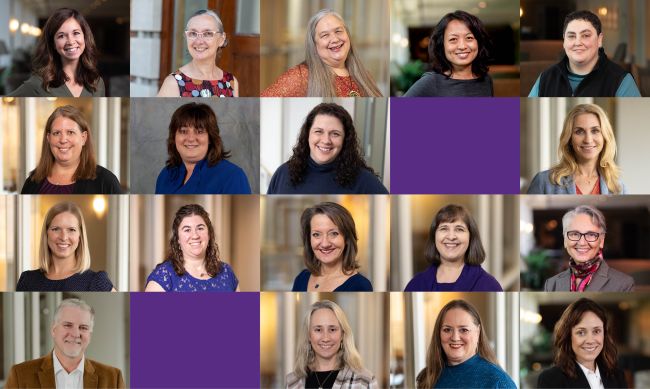
St. Catherine University
2004 Randolph Avenue
St. Paul, MN 55105

IMAGES
VIDEO
COMMENTS
The SILS doctoral program provides intensive, but highly flexible and customizable, preparation for careers in academia and research. The Ph.D. in Information and Library Science is designated as a STEM program, which allows eligible international graduates to apply for a 24-month OPT extension. Meet our Current PhD Students.
3. Customize Your Program. The PhD program in Library and Information Science (PhD/LIS) is composed of a cohesive and collaborative cohort of students who are mentored from enrollment through completion of the dissertation. This flexible PhD/LIS program is unique in its guided preparation in the three areas of research, teaching, and service.
The Doctor of Philosophy in Library and Information Science program, in the Department of Information culture and Data Stewardship (ICDS), prepares students for careers in research, education, and professional practice. The primary purpose of the PhD program is to develop an understanding of library and information science beyond the master's ...
The Ph.D. program includes a dissertation and requires 60 credit hours. There are two areas of study for students which are Information Access and Systems, and Information Studies and Services. Additionally, this program can be taken part-time or full-time to accommodate students' schedules.
The program requires 54 credit hours beyond the master's level, including 12 hours of dissertation preparation, with a cumulative GPA of 3.0 or above. You'll take 15 hours of core courses, two research methods courses, 12 hours of electives within your research area (with a goal of producing work for scholarly publication) and a nine-hour ...
Graduate Program Admissions. The School of Information and Library Science seeks exceptional students who have the potential to excel in graduate studies and to become future leaders in the field. We try each year to assemble a student body that is diverse on many levels (i.e., race, ethnicity, age, physical ability, cultural perspective ...
1. Educational Qualifications: The minimum academic qualification for admission to the Ph.D programmes is a Second Class Master's or equivalent degree in the relevant subject awarded by a recognised university in India or abroad, with at least an average of 55 per cent of aggregate marks, or a grade point average of 3.5 under the seven-point ...
The Doctor of Philosophy in Library and Information Science program, in the Department of Information Culture and Data Stewardship (ICDS), prepares students for careers in research, education, and professional practice. The primary purpose of the PhD program is to develop an understanding of library and information science beyond the master's degree, with particular emphasis on the conduct ...
Salary and Career prospects with a PhD in Library Science. According to the Bureau of Labor Statistics (BLS), Librarians and library media specialists earned an average yearly salary of $61,660 ($29.65 per hour) in May 2022. In addition, the BLS reported an employment increase of 3% from 2022 to 2032, about 13,700 new openings each year.
Preparing scholars who are passionate about the role of information in human affairs. Fostering cross-disciplinary thinking with research and academic expectations. Mastering the literature and practices in the broad field of information science. Developing in-depth knowledge in their specialty field.
PhD Admissions Requirements. ... The take-home exam has two parts: a broad perspective on current issues in the field of library science, information science, or archives, depending on the student's general area, and the area of the student's research specialization.
This page provides information about how a prospective student can apply to the School of Information Sciences PhD in Library and Information Science program. ... What are the requirements for admission? Bachelor's from an accredited college or university; GRE Applicants with GPAs of at least 3.0, or those with an earned JD, MD, or PhD, are ...
Requirements for the PhD degree, a 54-credit program, include a minimum of 36 course and seminar credits beyond the master's degree and 18 dissertation credits. The School of Computing and Information invites applications from students interested in the following areas: Archives and archival studies. Data stewardship. Digital curation.
A minimum score of 600 (paper-based), 250 (computer-based) or 100 (Internet-based) on the TOEFL is required for admission to the PhD in Library and Information Science program. Students may choose to take the International English Language Testing System exam (IELTS) in place of the TOEFL.
PhD in Library & Information Science (PhD LIS) Quality and innovation LIS faculty and doctoral students are committed to performing groundbreaking research that contributes to the evolution of the discipline and the development of the profession, and that strives to find solutions for the emerging information society. ...
School of Information Sciences Dean: Eunice Santos Program Contact: Katrina Hagler School of Information Sciences website iSchool Faculty 501 East Daniel Street, Champaign, IL 61820-6211 (217) 244-3432, (800) 982-0914 (within the US) ischool email. Admissions PhD in Information Science Admissions & Requirements Graduate College Admissions ...
Ph.D. in Library and Information Science. Admission to the Ph.D. program is competitive and is based on the strength of the applicant's educational background (with the expectation of an M.L.I.S. or master's-level degree in a related field), standardized test scores, work experience, a statement of research interests, and a personal interview.
The admission to Ph.D. programme is based on the vacancies available with the eligible Research Guides and the field of specialisation in which a scholar intends to pursue research. The desirous candidates are required to take an entrance examination conducted by the University for Ph.D. admission. The written examination consists of 100 ...
The average course fee for PhD Library and Information Science ranges between INR 3,000 to 25,000 depending upon the institute offering this course. After completing this course study, the students can find lucrative job profiles such as Librarian, Sr. Information Sourcing Analyst, Library Trainee, Library Director, Sr. Information Analyst ...
The U.S. News rankings of library and information studies master's programs are based solely on opinions of each program's quality as rated by academic experts at peer institutions. READ MORE. # 1 ...
Our Fall 2025 application will open in October 2024.Application DeadlineCompleted applications must be received no later than February 1.Application RequirementsAll applicants for admission to the doctoral program must hold a master's degree in library and information science from an ALA-accredited program or a recognized institution.
The Admission Committee of Library and Information Science reviews each applicant's entire record. The committee considers numeric scores, background, talent, and other attributes that are needed by the information professions. Readiness to engage in academic work, analytic and conceptual thinking ability, strong writing skills, a commitment to ...
The Doctor of Philosophy (Ph.D.) in Information Science at IU Bloomington is one of the oldest, continuously running information science doctoral programs in the nation. Our mission is to train the next generation of information scientists—professionals who want to understand, predict, and advance the ways in which people use information ...
Since the 90s, the University of Borås has offered doctoral education studies in library and information science. For years, this was in collaboration with the University of Gothenburg; since 2010, the university has had its own rights to grant doctoral degrees. From the beginning, there has been a strong research environment and doctoral ...
Admissions Information Masters plan A and PhD: January 5th: Application deadline for fall admission. September 1st: Application deadline for spring admission. Masters plan B (not considered for funding) Rolling admission Online Application Resources: How to Apply Choosing an Advisor Curriculum and Degree Options The Colorado Experience Guide to Applying to Grad School Fall Virtual Information ...
The library features both private and public study areas and maintains a collection of over 5,000 periodicals and 3,000 books, most of which are easily accessible in an electronic format. Public-access computers are available for database and web searching, word processing and presentations.
TISS is a unique institution that brings together high quality scholars and practitioners from Social, Economic, Political, Physical, Habitat, Engineering, Health, and Environmental Sciences to create interdisciplinary teaching and research programmes combined with field action to address the most critical current and emerging issues of the nation. . For information on these programmes and ...
If you have any questions about applying to the master's in college counseling program, call 805-493-3325 or email [email protected] to get in touch with a graduate admission counselor. Application Checklist. Online application; Advising appointment with a graduate admission counselor (strongly recommended) Recommendation forms (2)
Our online one-year program to add 3-6 license onto a current K-6 or K-12 teaching license. Taught within the Early Childhood Education program, you will learn about foundational pedagogy for ECE and how to meet the needs of diverse learners in the 3-6 setting. Gain real-world experience to prepare ...